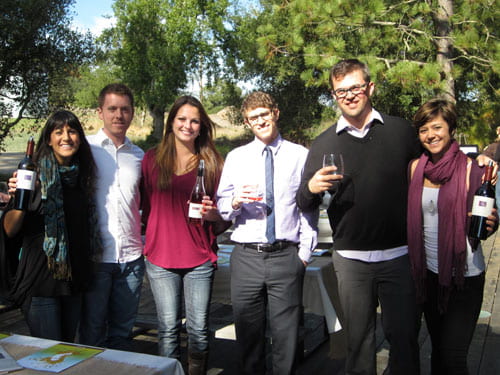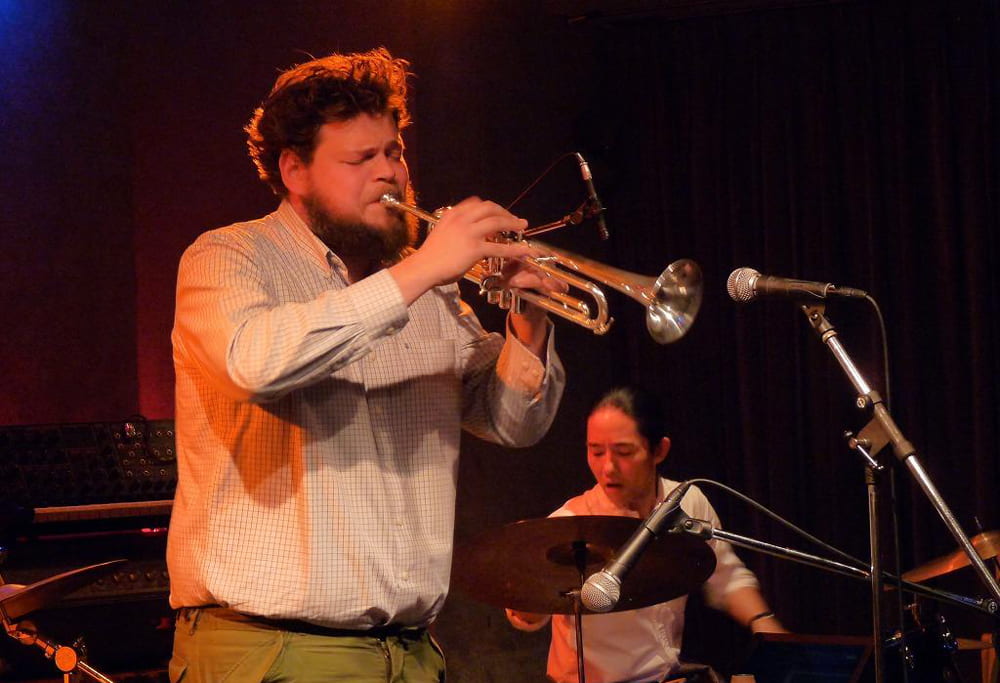Polish Music Newsletter Vol. 17, no. 12
PMC News
How You Can Support The PMC
Dear Friends of Polish Music,
As we have in the past, we are writing to you with our once-annual Polish Music Center fundraising appeal. We realize that the economic climate remains unfavorable for many and appreciate any level of support from you.
The Polish Music Center is the only non-governmental institution of its kind outside of Poland that does so much to preserve and promote Polish music locally and provide research assistance to scholars and performers worldwide. Last March we presented a fascinating concert of music by some of the youngest Polish-born composers residing in the U.S., capped with a performance of a Hollywood icon and friend of Polish music, David Lynch. In early October, we presented an excellent concert of Polish vocal, choral and liturgical music in our annual Paderewski Lecture-Recital series. Besides these concerts, we have co-organized the summer music exchange program between California’s Central Coast and the Tarnów region and provided music direction for the Paderewski Festival in Paso Robles in November. We publish this monthly Newsletter online and disseminate the latest news about Polish music via the internet and local print media. We are sure that more than a handful of Polish-Americans can be proud of supporting the Polish Music Center, an institution that has served Polish musical culture since 1985.
As 2011 comes to a close, we are finalizing plans for a two-day Festival of Premieres on March 23-24, 2012, and beginning to organize the next Paderewski Lecture-Recital that will celebrate the 75th anniversary of Karol Szymanowski’s death on Sunday, October 14, 2012. In conjunction with these projects, we would like to offer Concert Sponsorship opportunities to our major contributors. The names of Concert Sponsors will be placed on the program pages, and full or half page ads will be made available. Please contact the PMC for details on how to become a Concert Sponsor.
Concert Sponsorships notwithstanding, the amount contributed by each individual is as important as the overall number of supporters, because we would like to know that what we do on an everyday basis meets with your approval and merits your sponsorship. Since individual donations sustain everything we do, please consider making a donation this year. If you are a previous donor, please accept our heartfelt thanks. If you would like to contribute for the first time or as a continuing donor, please see our donation options below.
As always, we invite you to stop by our library on the USC campus to see first-hand what we are trying to accomplish. Please call us at (213) 821-1356 or email polmusic@thornton.usc.edu if you have any questions or would like to schedule a visit to the Center.
Thank you for your consideration. With our best wishes for the Holiday Season, we remain sincerely and gratefully yours,
Marek Zebrowski, Director – Polish Music Center USC
Krysta Close, Assistant Director – Polish Music Center USC
3 Ways To Donate
By Check
Please mail checks remitted to the “Polish Music Center USC” to the following address:
Polish Music Center
USC Thornton School of Music
840 West 34th Street
Los Angeles, CA 90089-0851
By Credit Card
Those who wish to donate by credit card can do so online at giveto.usc.edu or by contacting the PMC. Please be sure to indicate “Polish Music Center USC” in the Special Instructions section online, to ensure that your contribution is routed directly to our department.
By Charitable Gift Annuity
What is a charitable gift annuity? The charitable gift annuity provides a win-win gift option that benefits the donor and helps the Polish Music Center meet its goal of establishing a solid financial foundation for future operations. It is a simple contract where a donor or his/her designated beneficiary receives a fixed stream of payments for life in exchange for a gift to us. Your gift of property (real estate, stocks, bonds, cash, or other investment instrument) is transferred to the Polish Music Center at USC. In exchange, USC will pay you (or the designated beneficiary) a fixed amount annuity for life on either a quarterly, semiannual, or annual basis. Afterwards, the remaining balance of your gift passes to the Polish Music Center.
What are my benefits? Your benefits include a dependable stream of income for life with a yield that will in most cases exceed the rate of return on the stocks, bonds, or CDs you currently have in your portfolio. You will also receive an income tax deduction for the portion of your gift and a portion of your annuity payment will be tax free.
How does the Polish Music Center benefit from my gift? Our benefit is that, upon the termination of the contract, the remaining portion of your gift will contribute to our endowment fund, enabling the Polish Music Center to continue presenting concerts of Polish music, organizing lectures and conferences, and publishing our book series and our monthly Newsletter online. Your gift will also enable us to maintain our invaluable library and website and undertake many additional and important projects, including cataloguing and digitizing our collection of books, scores, and manuscripts, and providing scholarship assistance to music students from Poland enrolled in local schools and universities.
Thank you for considering our appeal. If you’d like to schedule a consultation with us and/or your financial advisor, please contact us at:
Polish Music Center, USC
840 West 34th Street
Los Angeles, CA 90089-0851
(213) 821-1356
polmusic@thornton.usc.edu
www.usc.edu/dept/polish_music
More Donations to “New Voices”
The recently-launched New Voices Collection of scores and sound recordings of works by young Polish composers continues to expand. Thanks to our Ambassador-at-large, composer Wojtek Blecharz, we have received the following items from the composers listed below:
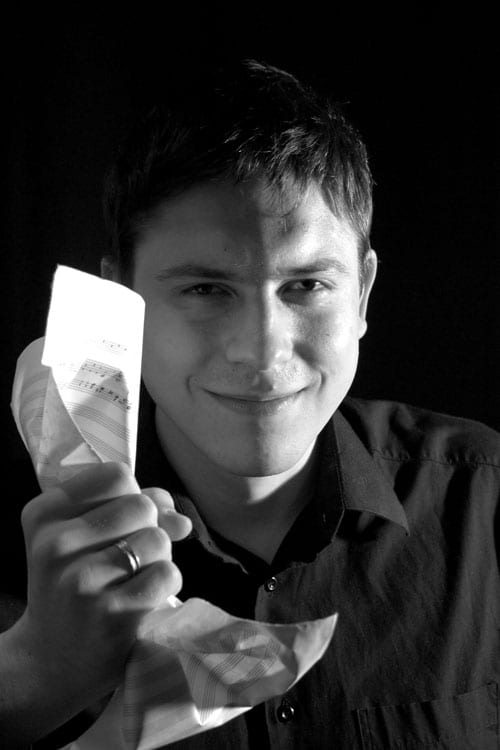
Mateusz Ryczek (b. 1986):
Scores:
- Timbres of The Night (flute solo)
- Shreds of Sleep (string quartet)
- Rings of Saturn (solo double bass)
- Sub-deep of The Night (piano solo)
- Metasonora (orchestra)
- Epsilon Aurigae (double bass and cello)
Recordings:
- MATEUSZ RYCZEK (*1986): Shreds of Sleep; Metasonora; Rituals of Time; Fugue of a hundred years ago; Sanctus; Rings of Saturn; Meditations II. The yearning of the rising sun
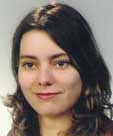 Barbara Kaszuba (b. 1983):
Barbara Kaszuba (b. 1983):
Scores:
- At the Mountain’s Glade (string orchestra)
- … from San Francisco Bay (string orchestra and percussion)
- Birds’ Concerto (violin, symphonic orchestra and voices of birds)
- Chatting for four bows (string quartet)
Recordings:
- BARBARA KASZUBA – MY MUSIC: Wspomnienie o Januszu Korczaku for violin solo; Toccata for piano ; Kontemplacje for violin solo; String trio “Trio zawadiackie”; Tanezzo for accordion solo; Skrzyp-ak for violin and accordion; Suoni per sei violinisti; Trio for flute, cello and piano “Wyspy szczęśliwe”; Na wierchowej polanie for chamber orchestra (AP0119)
 Maciej Jabłoński (b. 1974)
Maciej Jabłoński (b. 1974)
Scores:
- look, nothing arranges baskets of stars and lets them go, like fishes, into the sea (Concerto Grosso No. 3) (oboe, violin and chamber orchestra)
- The Labyrinth of Mind (six saxophones)
- Unfortunately it is over already (cello and piano)
Recordings:
- MACIEJ JABŁOŃSKI (* 1974): The Labyrinth of Mind; Unfortunately it is over already; look, nothing arranges baskets of stars and lets them go, like fishes, into the sea (Concerto Grosso No. 3); Logorhea; Barbapapa; Déjà vu; Mygoor
All of the above scores are available for performances. Please contact the PMC at polmusic@thornton.usc.edu or 213-821-1356 for details.
Other Individual Library Donations
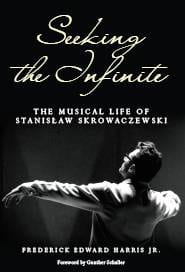 From conductor and scholar Dr. Fred Harris:
From conductor and scholar Dr. Fred Harris:
BOOK: Seeking the Infinite – The Musical Life of Stanisław Skrowaczewski. Author: Frederick Edward Harris, Jr., Forward by Gunther Schuller. Publisher: CreateSpace (2011)
 From scholar Dr. Peter Willis:
From scholar Dr. Peter Willis:
BOOK: Chopin in Manchester. Author: Peter Willis. Publisher: Elysium Press Publishers (30 November 2011). ISBN: 978-0904712056
 From composer Jarosław Gołembiowski:
From composer Jarosław Gołembiowski:
SCORE: Music for Hours – Hours of Light & Hours of Darkness for solo piano. Composer: Jarosław Gołembiowski. Producer: Jaroslaw Golembiowski Music Productions
 CD: New Music – New Pianist: Lullaby For Good Morning Op. 89; B.A.C.H. Op.81; Sonata Op. 75; Three Preludes from Op.8; Study Op. 83 No.2; Three Mazurkas Op. 79; Mephisto Waltz “No.5” Op.1 No.2; Elegant Waltz Op.25 No.9; Tango Op.58; Moorish Dance Op.57; Blues Op.44. Performer: Adam Golka – piano. Composer: Jarosław Gołembiowski (b. 1958). Producer: Jaroslaw Golembiowski Music Productions
CD: New Music – New Pianist: Lullaby For Good Morning Op. 89; B.A.C.H. Op.81; Sonata Op. 75; Three Preludes from Op.8; Study Op. 83 No.2; Three Mazurkas Op. 79; Mephisto Waltz “No.5” Op.1 No.2; Elegant Waltz Op.25 No.9; Tango Op.58; Moorish Dance Op.57; Blues Op.44. Performer: Adam Golka – piano. Composer: Jarosław Gołembiowski (b. 1958). Producer: Jaroslaw Golembiowski Music Productions
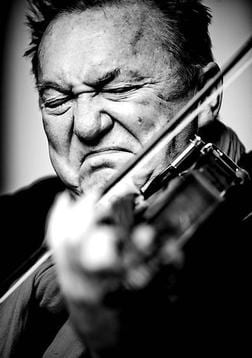
From filmmaker Wiesław Dabrowski:
DVD: Michal Urbaniak – A New Yorker by Choice. Writer/Director: Wiesław Dabrowski. Cinematographers: Kamil Dabrowski, Anna Walichnowska
From Danuta Kassern Amerio (niece of composer Tadeusz Zygfryd Kassern):
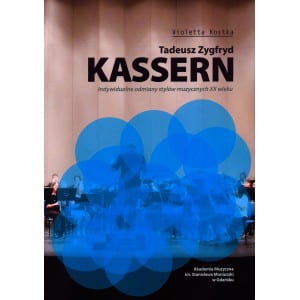 BOOK: Tadeusz Zygfryd Kassern – Indywidualne odmiany stylów muzycznych XX wieku. Author: Violetta Kostka. Publisher: Wydawnictwa Akademii Muzycznej im. Staisława Moniuszki w Gdańsku
BOOK: Tadeusz Zygfryd Kassern – Indywidualne odmiany stylów muzycznych XX wieku. Author: Violetta Kostka. Publisher: Wydawnictwa Akademii Muzycznej im. Staisława Moniuszki w Gdańsku
From scholar and Kosciuszko Foundation representative Joseph A. Herter:
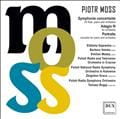 CD: Piotr Moss – Symphonie concertante, Adagio III and Portraits. Performers: Elżbieta Gajewska – flute, Barbara Halska – piano, Emilian Madey – piano, National Polish Radio Symphony Orchestra – cond. Zbigniew Graca, Polish Radio and Television Orchestra in Cracow – cond. Zbigniew Graca, The Polish Radio Symphony Orchestra – cond. Tomasz Bugaj. Producer: DUX Records (0839)
CD: Piotr Moss – Symphonie concertante, Adagio III and Portraits. Performers: Elżbieta Gajewska – flute, Barbara Halska – piano, Emilian Madey – piano, National Polish Radio Symphony Orchestra – cond. Zbigniew Graca, Polish Radio and Television Orchestra in Cracow – cond. Zbigniew Graca, The Polish Radio Symphony Orchestra – cond. Tomasz Bugaj. Producer: DUX Records (0839)
 PROGRAM: Jubilee Gala celebrating 110 years of the National Philharmonic in Warsaw. November 5, 2011 – Warsaw. Performers: Dang Thai Son – piano, National Philharmonic Orchestra – Antoni Wit, cond.
PROGRAM: Jubilee Gala celebrating 110 years of the National Philharmonic in Warsaw. November 5, 2011 – Warsaw. Performers: Dang Thai Son – piano, National Philharmonic Orchestra – Antoni Wit, cond.
Great Music, Great Performers, Great Wine!
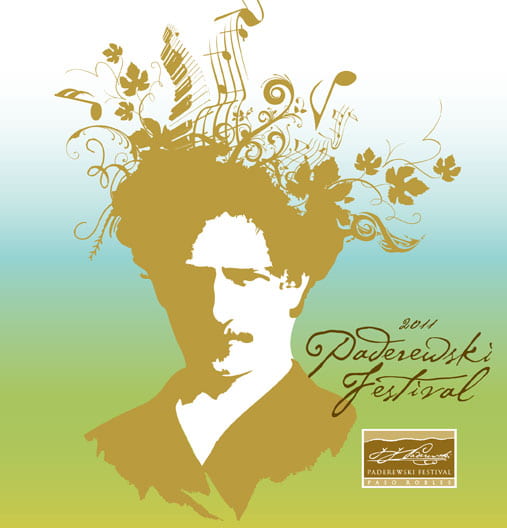 Held from November 10-13, the 2011 Paderewski Festival in Paso Robles featured a rich variety of concert offerings, ranging from choral music to solo piano and chamber music programs. Organized by the Board of the Paderewski Festival, this annual celebration of the most famous resident of Paso Robles was sponsored by a number of prestigious wineries in the region, including Epoch Estate Wines, Tablas Creek Vineyard, Cass Winery, Hope Family Wines, Pear Valley Winery and Vina Robles Winery, as well as the Paso Robles Wine Country Alliance. The Festival was well attended and audiences were enthusiastic about this year’s performers across the board.
Held from November 10-13, the 2011 Paderewski Festival in Paso Robles featured a rich variety of concert offerings, ranging from choral music to solo piano and chamber music programs. Organized by the Board of the Paderewski Festival, this annual celebration of the most famous resident of Paso Robles was sponsored by a number of prestigious wineries in the region, including Epoch Estate Wines, Tablas Creek Vineyard, Cass Winery, Hope Family Wines, Pear Valley Winery and Vina Robles Winery, as well as the Paso Robles Wine Country Alliance. The Festival was well attended and audiences were enthusiastic about this year’s performers across the board.
The elegant interiors of Vina Robles Winery were a perfect backdrop for the official opening of the 2011 Paderewski Festival on Thursday, November 10. A number of local community leaders were present, including San Luis Obispo County Supervisor, Frank Mecham, Mayor of Paso Robles, Duane Picanco and Mayor Pro Tem, John Hamon, as well as members of the City Council and Board of Directors of the Paderewski Festival. Mirosław Banach, Deputy Supervisor of the Tarnów District in Poland, was on hand as well. His presence testified to the well-established cultural cooperation program that has been in effect since the agreement of cooperation between Paso Robles and Tarnów was signed in 2008.
Following official speeches and welcome, the Cuesta College North County Chorus led by Cassandra Tarantino opened the Festival with two staples of Polish choral repertoire: Nowowiejski’s patriotic hymn Rota, and Daylight Declines, a lyrical late Renaissance motet by Wacław z Szamotuł. Both pieces were sung in excellent Polish and delivered with passionate understanding of the music, which is rarely-heard outside of Poland. Keeping to the theme of music celebrating the Winter Solstice, the choir also presented excerpts from Mozart’s Requiem and Morten Lauridsen’s Lux Aeterna. The Frölich Ensemble—a subset of soloists drawn from the Cuesta College North County Chorus—gave an intimate yet spirited interpretation of works by two Spanish Renaissance composers, Juan del Encina and Juan Arañés. The program ended with René Clausen’s Set Me as a Seal. The well-deserved applause for the performance was shared by the choir, Ms. Tarantino, and their able piano accompanist, Kevin Hahn.
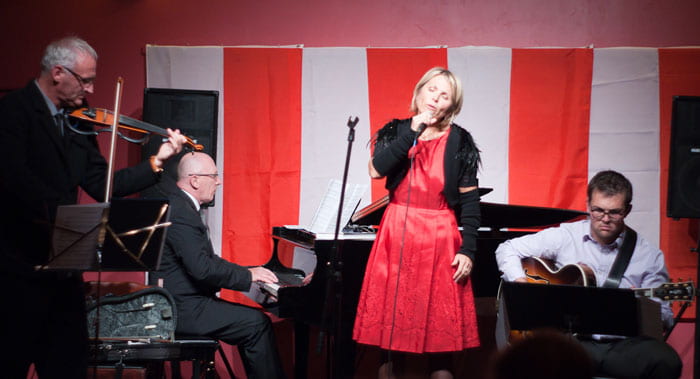
On Friday, November 11, Cass Winery held its traditional Festival Friday series. For the past two years the programs on offer at this charming winery located on Paso’s east side have featured the lighter side of Polish music. Last year, Cass Winery hosted Krzesimir Dębski and Anna Jurksztowicz in an evening of film music (right); this year they presented another Polish superstar and jazz virtuoso, Leszek Możdżer. Mr. Możdżer held the full house audience spellbound for well over an hour of brilliant music-making. His confident and fluent keyboard touch produced a beautiful tone from the piano. But the palette of Możdżer’s sounds evoked in performance was also supplemented by various objects—pieces of cloth or plastic or metal—that he placed directly on top of certain sections of piano strings to achieve a number of unusual and beguiling sound effects. They proved especially apt in such well-known standards as the Lullaby from Polański’s celebrated film, Rosemary’s Baby (as well as a few other tunes from Możdżer’s recent album devoted to compositions by Krzysztof Komeda), or the soloist’s beautiful reinterpretations of two Chopin’s Mazurkas, blending nostalgia and virtuosity in an unforgettable way.
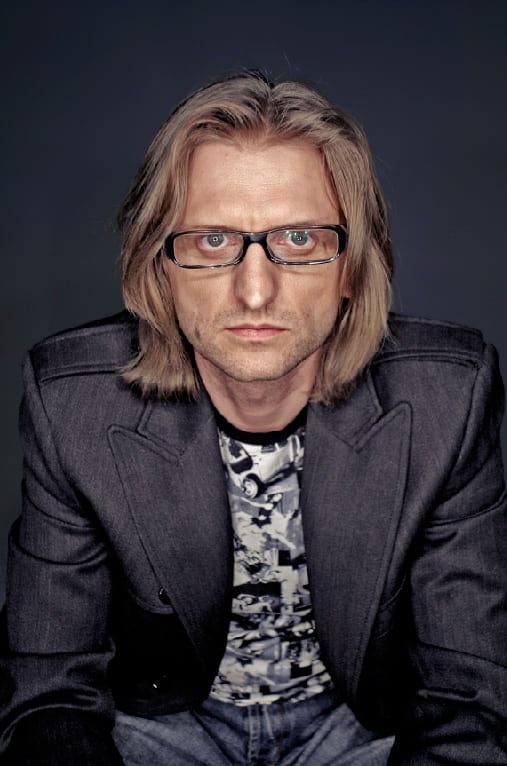 Following an excellent lecture at the Pioneer Museum, Saturday afternoon of November 12 was reserved for showcasing the winners of the 2011 Youth Piano Competition in the historic interiors of the Paso Robles’ Inn Ballroom. Entrants from three Central Coast Counties—San Luis Obispo, Santa Barbara, and Monterey—competed for a generous purse of prizes and the opportunity to participate in the cultural exchange program in Poland in 2013. Sofia Talarico, an 11-year old from Atascadero and winner of the new Paderewski Legacy Award, opened the program with a confident performance of Beethoven’s famous Für Elise. Elizabeth Lee, a 10-year old from Pacific Grove and winner of the Junior Division Third Prize, gave a dainty performance of Burgmuller’s The Knight Errant. Winner of the Second Prize in the Junior Division, 10-year old Kevin Park from Santa Maria, enchanted the audience with his deeply romantic and mature interpretation of Chopin’s celebrated Waltz in A minor, Op. 34. He followed with a spirited spin of Beethoven’s Rondo in C major, Op. 51, receiving a well-deserved round of applause for his effort. Daniel Ha—the 10-year old winner of the First Prize in the Junior Division—opened his program with a stylish presentation of the first movement from Beethoven’s F minor Piano Sonata, Op. 2. The third movement of Kabalevsky’s Sonatina, Op. 13 had a lot of drive and sparkle. This year’s success builds upon Daniel’s last year performance at the Youth Competition, for which he was recognized with an Honorary Mention. Madeline Anderson, winner of the First Prize in the Senior Division (and also a Junior Division finalist in previous years), gave an excellent reading of Paderewski’s Chant du Voyageur, Op. 8 no. 5 and followed with a tender rendition of Liszt’s Rigoletto Paraphrase. The overflowing audience greeted all finalists with a robust applause as the Festival President Joel Peterson, Treasurer Steve Cass, and Youth Competition Coordinator Rachel Garrett presented the young pianists with medals and monetary awards.
Following an excellent lecture at the Pioneer Museum, Saturday afternoon of November 12 was reserved for showcasing the winners of the 2011 Youth Piano Competition in the historic interiors of the Paso Robles’ Inn Ballroom. Entrants from three Central Coast Counties—San Luis Obispo, Santa Barbara, and Monterey—competed for a generous purse of prizes and the opportunity to participate in the cultural exchange program in Poland in 2013. Sofia Talarico, an 11-year old from Atascadero and winner of the new Paderewski Legacy Award, opened the program with a confident performance of Beethoven’s famous Für Elise. Elizabeth Lee, a 10-year old from Pacific Grove and winner of the Junior Division Third Prize, gave a dainty performance of Burgmuller’s The Knight Errant. Winner of the Second Prize in the Junior Division, 10-year old Kevin Park from Santa Maria, enchanted the audience with his deeply romantic and mature interpretation of Chopin’s celebrated Waltz in A minor, Op. 34. He followed with a spirited spin of Beethoven’s Rondo in C major, Op. 51, receiving a well-deserved round of applause for his effort. Daniel Ha—the 10-year old winner of the First Prize in the Junior Division—opened his program with a stylish presentation of the first movement from Beethoven’s F minor Piano Sonata, Op. 2. The third movement of Kabalevsky’s Sonatina, Op. 13 had a lot of drive and sparkle. This year’s success builds upon Daniel’s last year performance at the Youth Competition, for which he was recognized with an Honorary Mention. Madeline Anderson, winner of the First Prize in the Senior Division (and also a Junior Division finalist in previous years), gave an excellent reading of Paderewski’s Chant du Voyageur, Op. 8 no. 5 and followed with a tender rendition of Liszt’s Rigoletto Paraphrase. The overflowing audience greeted all finalists with a robust applause as the Festival President Joel Peterson, Treasurer Steve Cass, and Youth Competition Coordinator Rachel Garrett presented the young pianists with medals and monetary awards.
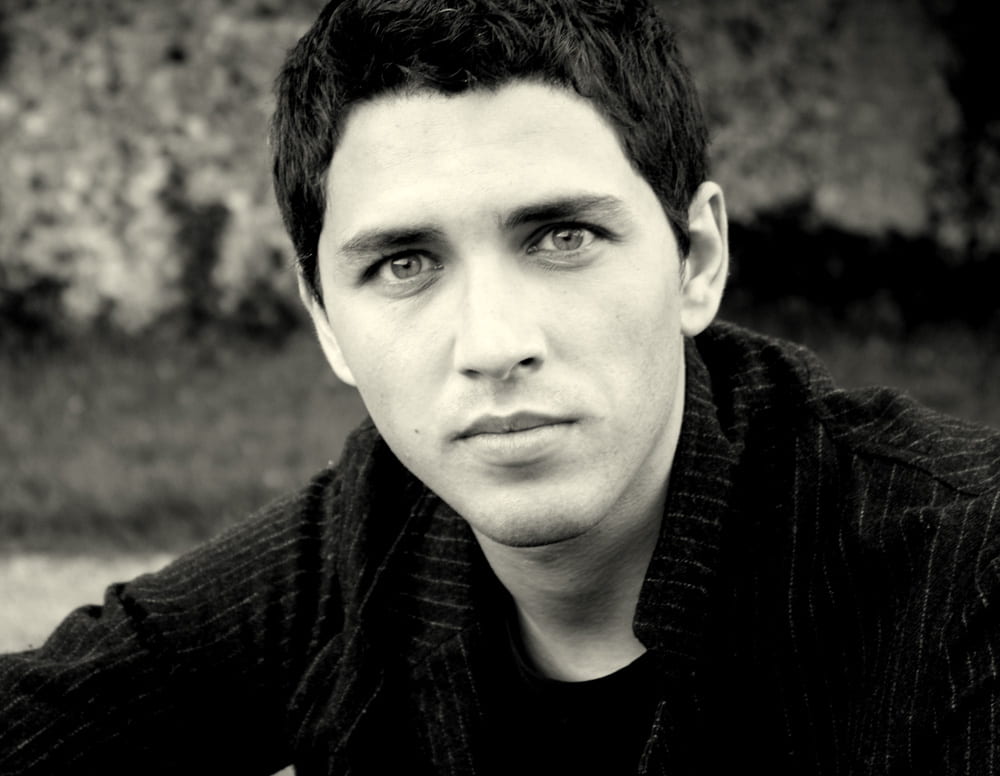 Saturday night Festival Gala concert featured Russian-born pianist Eduard Kunz, winner of several international piano competitions, including the 2010 Paderewski International in Bydgoszcz, Poland. Mr. Kunz opened the program with two of Paderewski’s best-known miniatures, the Menuet, Op. 14 and Nocturne, Op. 16. Both received a gentle, salon-style treatment with Paderewski-like rubato, testifying to Mr. Kunz’s interest in historical research of performance practice. Mr. Kunz’s program continued with a group of Chopin’s miniatures that opened with Lento con gran espressione in C-sharp minor, opus posthumous. Here and in the following mélange of Waltzes interspersed with two Mazurkas, Mr. Kunz proved his mastery at evoking delicate moods and shadings with his lightening-speed yet gossamer touch. This kind of intimate, deeply-felt music-making must have been the hallmark of Chopin’s soirees in Paris that held the audiences mesmerized; it was so again in the Ballroom on this occasion. Departing from his stated intentions, after the intermission, Mr. Kunz substituted a Bach-Liszt transcription and Liszt’s Six Consolations with selections from Albéniz and Rachmaninov. Unlike the first half, where he used scores and a page turner, during the second half of the recital Mr. Kunz seemed much more at ease and liberated. He channeled the spirit of Spain in Albéniz’s Evocación and plunged, full-force, into Rachmaninov’s Moments musicaux, giving them a truly magisterial reading. As promised in the program, Mr. Kunz concluded with Liszt’s Hungarian Rhapsody No. 12 that was delivered with breathtaking bravura and panache. A standing ovation from the audience ensued and Mr. Kunz obliged with another dazzling rendition of Liszt, this time his transcription of one of Paganini’s solo violin caprices.
Saturday night Festival Gala concert featured Russian-born pianist Eduard Kunz, winner of several international piano competitions, including the 2010 Paderewski International in Bydgoszcz, Poland. Mr. Kunz opened the program with two of Paderewski’s best-known miniatures, the Menuet, Op. 14 and Nocturne, Op. 16. Both received a gentle, salon-style treatment with Paderewski-like rubato, testifying to Mr. Kunz’s interest in historical research of performance practice. Mr. Kunz’s program continued with a group of Chopin’s miniatures that opened with Lento con gran espressione in C-sharp minor, opus posthumous. Here and in the following mélange of Waltzes interspersed with two Mazurkas, Mr. Kunz proved his mastery at evoking delicate moods and shadings with his lightening-speed yet gossamer touch. This kind of intimate, deeply-felt music-making must have been the hallmark of Chopin’s soirees in Paris that held the audiences mesmerized; it was so again in the Ballroom on this occasion. Departing from his stated intentions, after the intermission, Mr. Kunz substituted a Bach-Liszt transcription and Liszt’s Six Consolations with selections from Albéniz and Rachmaninov. Unlike the first half, where he used scores and a page turner, during the second half of the recital Mr. Kunz seemed much more at ease and liberated. He channeled the spirit of Spain in Albéniz’s Evocación and plunged, full-force, into Rachmaninov’s Moments musicaux, giving them a truly magisterial reading. As promised in the program, Mr. Kunz concluded with Liszt’s Hungarian Rhapsody No. 12 that was delivered with breathtaking bravura and panache. A standing ovation from the audience ensued and Mr. Kunz obliged with another dazzling rendition of Liszt, this time his transcription of one of Paganini’s solo violin caprices.
The warm sunshine and pale blue skies of late fall were the accompaniment for the Epoch Estate Wine Series concert at the historic York Mountain Winery. Paderewski’s grapes were processed there in the 1930s and the new owners, who also own a portion of Paderewski’s former ranches, are bringing back not only the Zinfandel grapes that Paderewski cultivated but also support music-making on their spectacular property. The New West Guitar Group—Perry Smith, John Storie, and Jeff Stein—presented a delightfully low-key jazz/country blend of music that was followed with a Polish-themed brunch served on the terrace of Epoch’s tasting room. The afternoon music and the idyllic rural surroundings seemed to put the assembled audience into a most pleasant trance, contemplating this year’s Festival and some already thinking forward to next year.
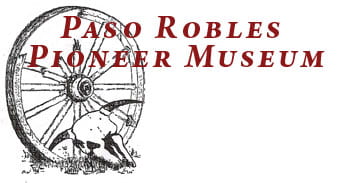 In other festival-related events, Dr. Kenneth H. Marcus—Professor of History at La Verne University—presented an excellent and well-researched lecture on Paderewski, Modjeska and the California Environment at the Paso Robles Pioneer Museum. Dr. Marcus provided fascinating insights into the friendship of these two Polish artists, their connections to California, and their ideas for living and transforming the landscape of their surroundings. The Pioneer Museum and Carnegie Library in downtown Paso also featured exhibits of Paderewski-related memorabilia, culled from their own holdings and combined with many fascinating items from the Paso Robles Collection held at the Polish Music Center, USC. Throughout the Festival, concerts in all wineries were preceded by wine tastings, giving attendees a chance to check the best wines on offer by each of the sponsors. As a special favor to the visitors eager to have a small sample of Polish cooking, the Paso Robles Inn dining room also featured a “Paderewski Menu” composed of several staples of Polish cuisine. Just as in past years, the Paderewski Festival in Paso Robles attracted many visitors from Los Angeles and San Francisco as well as a number of local supporters, who also had a chance to attend the Elegant Evening event—an annual Victorian-themed walkabout around the downtown park and neighboring businesses and art galleries in this charming Central Coast town.
In other festival-related events, Dr. Kenneth H. Marcus—Professor of History at La Verne University—presented an excellent and well-researched lecture on Paderewski, Modjeska and the California Environment at the Paso Robles Pioneer Museum. Dr. Marcus provided fascinating insights into the friendship of these two Polish artists, their connections to California, and their ideas for living and transforming the landscape of their surroundings. The Pioneer Museum and Carnegie Library in downtown Paso also featured exhibits of Paderewski-related memorabilia, culled from their own holdings and combined with many fascinating items from the Paso Robles Collection held at the Polish Music Center, USC. Throughout the Festival, concerts in all wineries were preceded by wine tastings, giving attendees a chance to check the best wines on offer by each of the sponsors. As a special favor to the visitors eager to have a small sample of Polish cooking, the Paso Robles Inn dining room also featured a “Paderewski Menu” composed of several staples of Polish cuisine. Just as in past years, the Paderewski Festival in Paso Robles attracted many visitors from Los Angeles and San Francisco as well as a number of local supporters, who also had a chance to attend the Elegant Evening event—an annual Victorian-themed walkabout around the downtown park and neighboring businesses and art galleries in this charming Central Coast town.
For more information about the Festival, visit www.paderewskifest.comor watch a video about this year’s events on YouTube. See you in 2012!
[MZ]
News
Sikora / Madame Curie Premieres
 Composer Elżbieta Sikora and librettist Agata Miklaszewska have teamed up to create an opera about the great chemist Maria Curie-Skłodowska (Mme. Marie Curie), who has been celebrated throughout 2011. Commissioned by the Baltic Opera and co-financed by the Ministry of Culture and National Heritage (MKiDN), Madame Curie production features 10 soloists, a 30-member choir and dancers from the Baltic Dance Theatre. The World Premiere performance of Madame Curie took place at the UNESCO Auditorium in Paris on November 15, 2011, and was accompanied by an exhibit about her life and achievements.
Composer Elżbieta Sikora and librettist Agata Miklaszewska have teamed up to create an opera about the great chemist Maria Curie-Skłodowska (Mme. Marie Curie), who has been celebrated throughout 2011. Commissioned by the Baltic Opera and co-financed by the Ministry of Culture and National Heritage (MKiDN), Madame Curie production features 10 soloists, a 30-member choir and dancers from the Baltic Dance Theatre. The World Premiere performance of Madame Curie took place at the UNESCO Auditorium in Paris on November 15, 2011, and was accompanied by an exhibit about her life and achievements.
Avoiding a linear account and bordering on a monodrama, Madame Curie evokes the different facets of this women’s life as a scientist, wife and mother, her ambitions, her emotions and also her doubts and fears. The contemporary musical structure of the opera includes: an overture, mixed choral music, recitatives, arias and orchestral parts featuring saxophone, accordion, electric guitar, and electronic music elements.
The following is an excerpt from the opera’s director Marek Weiss statement about Mme. Curie and his personal connection to as a character and a human:
…Recently a lot of publications about her came out where authors try to polish her statue and bring back to peoples’ memory the human part of Marie Curie’s life. We have decided to join these truth seekers and tell in our own, opera way about this extraordinary woman who conquered the world overcoming numerous obstacles such as human aversion, hostility and her own weaknesses. Her strong character and ingenious mind grew in a delicate body, brought to a test by passions, desire and temptation, that were a far cry from the puritan image of a workaholic straight from laboratory. A beautiful, dramatic character—a human through and through. That is how we would like to present her and how we want to love her.
 The publishers of the opera, PWM Editions, have posted a great deal of news regarding this exciting premiere on its website, including an interview with the composer. In it, composer Elżbieta Sikora (at right) talks about her initial search for a modern and bold heroine and the subsequent creation of Madame Curie, which tells a life story that was “already like an opera libretto in itself.” There are also interviews with stage director Marek Weiss, soprano Anna Mikolajczyk-Niewiedział, who sings the titular character, and Dr. Roman Luboradzki from the Institute of Physical Chemistry at the Polish Academy of Sciences.
The publishers of the opera, PWM Editions, have posted a great deal of news regarding this exciting premiere on its website, including an interview with the composer. In it, composer Elżbieta Sikora (at right) talks about her initial search for a modern and bold heroine and the subsequent creation of Madame Curie, which tells a life story that was “already like an opera libretto in itself.” There are also interviews with stage director Marek Weiss, soprano Anna Mikolajczyk-Niewiedział, who sings the titular character, and Dr. Roman Luboradzki from the Institute of Physical Chemistry at the Polish Academy of Sciences.
PWM also made the following statement about the opera’s premiere:
We are delighted to announce that Elżbieta Sikora’s new opera Madame Curie was received by the Parisian public with great enthusiasm. The audience gave a particularly warm welcome to the composer and the excellent actress in the lead role—Anna Mikołajczyk-Niewiedział. The audience was captivated by the interesting design of the work, particularly highlighted by the director, Marek Weiss and the great music.
Following the success of the World Premiere in Paris, Polish audiences were able to admire the work at the Baltic Opera in Gdańsk during the Polish premiere on November 25, 2011. Joining Anna Mikołajczyk-Niewiedział for both performances were Paweł Skałuba as Pierre Curie, Tomasz Rak as Paul Langevin, and Leszek Skrla as Einstein, as well as the Choir and Orchestra of the Baltic Opera with Grzegorz Wieczorek – clarinet (solo) and Wojciech Michniewski – conductor and musical director.
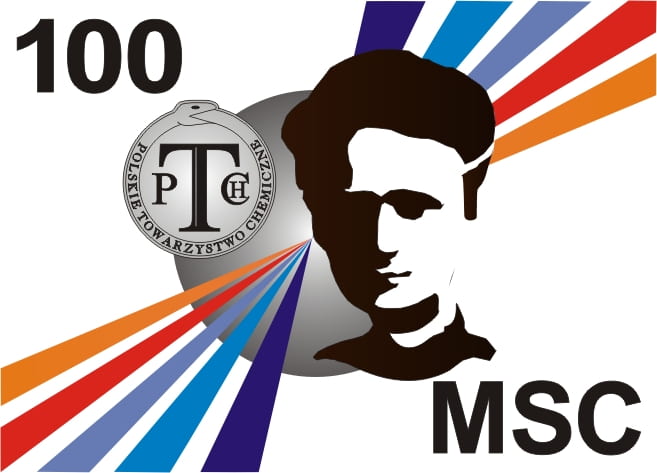 Madame Curie was produced as a part of celebrations of the International Year of Chemistry and 100th Anniversary of the Nobel Prize for Marie Skłodowska-Curie and presented as a part of International Cultural Programme of the Polish EU Presidency.
Madame Curie was produced as a part of celebrations of the International Year of Chemistry and 100th Anniversary of the Nobel Prize for Marie Skłodowska-Curie and presented as a part of International Cultural Programme of the Polish EU Presidency.
[Sources: pwm.com.pl, operabaltycka.pl, culture.pl, unesco.org]
Premieres At Silesian Quartet Chamber Music Festival
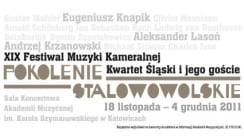 In 1993, the Silesian Quartet launched an annual International Chamber Music Festival “Silesian Quartet and their guests”. This year’s 19th edition of the Festival (Nov. 18 – Dec. 4, 2011) celebrates the founders of “Stalowa Wola Generation”—Andrzej Krzanowski, Eugeniusz Knapik and Aleksander Lasoń—who are celebrating their 60th anniversary in 2011. The “Stalowa Wola Generation,” also known as “Generation 51,” refers to the generation of composers born after WWII and led by these three Silesian composers who all made their debuts at the “Young Musicians for a Young City” Festival in Stalowa Wola. “The arrival of that generation on the scene of Polish contemporary music coincided with a radical rejection of avant-garde ideas, which had ruled unchallenged for nearly two decades. For the composers of the previous generation, this return to an abandoned tradition often represented a return to the ‘cursed’ tonal system.” [quoted from the program notes of the 2011 “Warszawska Jesień” Contemporary Music Festival]
In 1993, the Silesian Quartet launched an annual International Chamber Music Festival “Silesian Quartet and their guests”. This year’s 19th edition of the Festival (Nov. 18 – Dec. 4, 2011) celebrates the founders of “Stalowa Wola Generation”—Andrzej Krzanowski, Eugeniusz Knapik and Aleksander Lasoń—who are celebrating their 60th anniversary in 2011. The “Stalowa Wola Generation,” also known as “Generation 51,” refers to the generation of composers born after WWII and led by these three Silesian composers who all made their debuts at the “Young Musicians for a Young City” Festival in Stalowa Wola. “The arrival of that generation on the scene of Polish contemporary music coincided with a radical rejection of avant-garde ideas, which had ruled unchallenged for nearly two decades. For the composers of the previous generation, this return to an abandoned tradition often represented a return to the ‘cursed’ tonal system.” [quoted from the program notes of the 2011 “Warszawska Jesień” Contemporary Music Festival]
The program of the 2011 Chamber Music Festival featured chamber compositions by Knapik and Lasoń, who are both currently professors of composition at Music Academy in Katowice, as well as the late Krzanowski. A highlight was the World Premiere of Krzanowski’s Accordion Quartet, performed on December 3 by accordionists Daniel Lis, Ewa Grabowska-Lis, Eneasz Kubit, and Leszek Kołodziejski in the Concert Hall of the Szymanowski Music Academy in Katowice. This premiere comes after many years of the Quartet’s existence in only the composer’s manuscripts. There was also an opportunity to hearthe World Premiere of String Quartet No. 3by Grażyna Krzanowska (Andrzej’s wife), who was also involved in the “Stalowa Wola Generation” movement many years ago. It was performed by the Silesian Quartet on December 4 in the Concert Hall of the Szymanowski Music Academy.
The audience will also hear music by Olivier Messiaen, Gustav Mahler, Charles Ives, Bela Bartok, Dimitr Schostakovich, Igor Stravinsky, Johann Sebastian Bach and Ludvig van Beethoven – composers, who had profound influence on style of “Stalowa Wola Generation” composers. For a full program listing, visit pwm.com.pl.
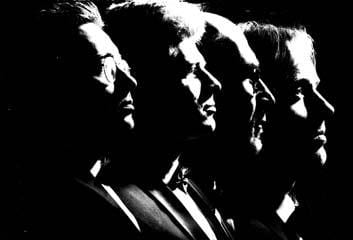 For this year’s Festival, the Silesian Quartet (at left) was joined by NOSPR and the Silesian Philharmonic, enriching the “Stalowa Wola”-themed Festival with symphonic as well as chamber works. There were all together nine concerts, spread out over three weekends, with each weekend dedicated to a different composer.
For this year’s Festival, the Silesian Quartet (at left) was joined by NOSPR and the Silesian Philharmonic, enriching the “Stalowa Wola”-themed Festival with symphonic as well as chamber works. There were all together nine concerts, spread out over three weekends, with each weekend dedicated to a different composer.
[Sources: polmic.pl, warszawska-jesien.art.pl culture.pl, am.katowice.pl, pwm.com.pl]
Frankenstein Premiere
A new musical version of the history of Doctor Frankenstein and Frankenstein’s Monster was the first premiere of the season at the Capitol Music Theatre in Wrocław, Poland. Based on Wojciech Kościelniak’s script and direction and music by Piotr Dziubek, the premiere took place on November 23, 2011, with Mariusz Kiljan as Doctor Frankenstein and Cezary Studniak as Frankenstein’s Monster.
The production is based on Mary Shelley’s famous novel published in 1818. The idea was conceived two years before at Lake Geneva in Switzerland.
Writer and director Wojciech Kościelniak says this about Frankenstein (from Rzeczpospolita, 16 November 2011):
I propose to play with horror for the audience. In theatre, especially music theatre, horror in earnest can amuse more than terrify. However, the show will not be a parody or farce. I want to evoke a whole range of emotions – to amuse, to move, and to perturb the audience…. The murderous creature has become a pop culture icon, but also a symbol of primeval evil and irrational fear…. A musical need not be easy and pleasant entertainment. Shelley’s story seems banal, but gives food for thought. I show a genius obsessed with a destructive desire for success, as well as the monstrous consequences of putting oneself in the role of God.
[Source: beethoven.org.pl]
Paderewski Scholarship Fund Opportunities
Established in 2004 by Ambassador Edward L. Rowny, the Paderewski Scholarship Fund brings students from Poland to the US for a summer course of study at Georgetown University, where they learn about democracy in America and the free market system. According to Ambassador Rowny: “Most people know Paderewski as a famous pianist but few know that he was an eminent scholar as well. If he had not drafted the thirteenth point for President Wilson to present at the Versailles Treaty Conference there would be no free democratic, independent Poland today. He was a man of stirring character and impeccable integrity. He is a perfect mentor for Polish students.”
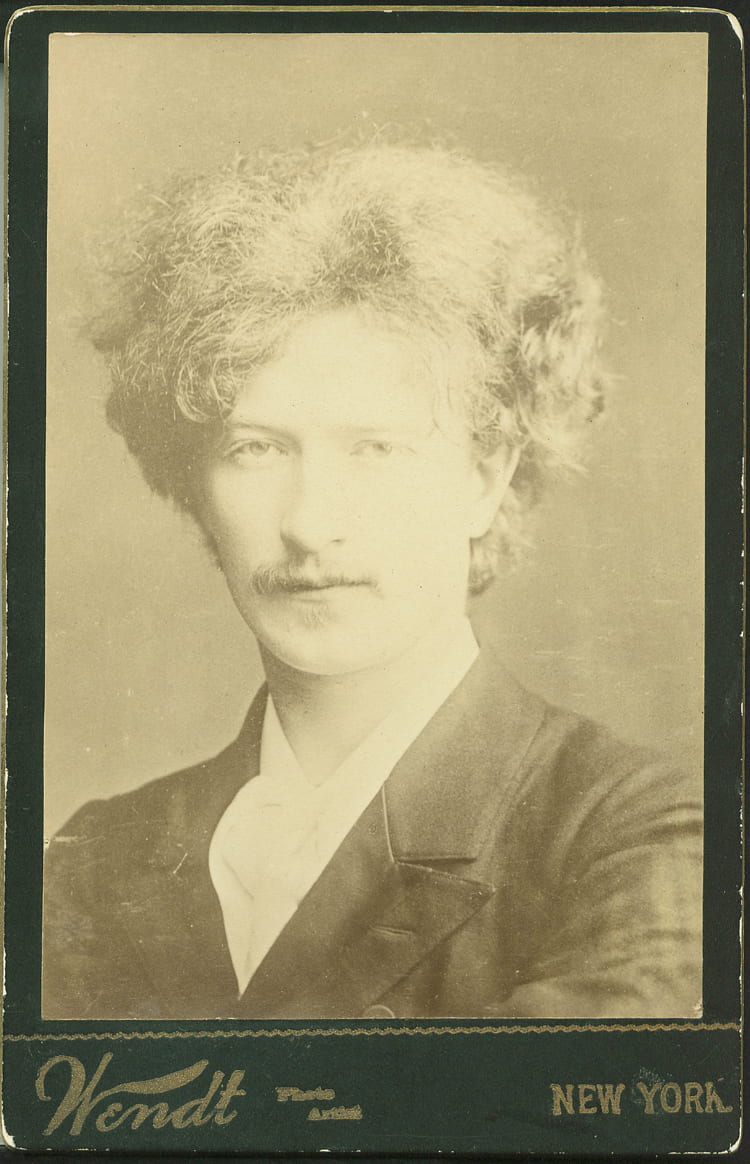 The Paderewski Scholarship Fund is currently offering three ways to contribute to their efforts. The first is to purchase tickets for the Benefit Concert on Saturday, February 11, 2012 at the Italian Embassy in Washington, D.C. The concert will feature the world famous pianist John Robilette and will be broadcast on CNN. Prior to the concert, Ambassador Rowny will discuss Paderewski’s contribution to freedom and culture, and his life as a composer, pianist, and eminent statesman. Please note that checks should be payable to the Paderewski Ticket Sales and are not tax deductible—see padfundconcert.pdf for details.
The Paderewski Scholarship Fund is currently offering three ways to contribute to their efforts. The first is to purchase tickets for the Benefit Concert on Saturday, February 11, 2012 at the Italian Embassy in Washington, D.C. The concert will feature the world famous pianist John Robilette and will be broadcast on CNN. Prior to the concert, Ambassador Rowny will discuss Paderewski’s contribution to freedom and culture, and his life as a composer, pianist, and eminent statesman. Please note that checks should be payable to the Paderewski Ticket Sales and are not tax deductible—see padfundconcert.pdf for details.
The second way you can contribute to the Paderewski Scholarship Fund is to buy an advertisement for the Concert’s Memorial Program. Details on how to purchase advertisements are also attached. As with the tickets, checks for the ads should be made out to Paderewski Ticket Sales and are not tax deductible—see padfundad.pdf for details.
Finally, you can contribute to the Paderewski Scholarship Fund by making a tax-deductible direct donation. Checks should be made out to the Fund for American Studies and sent to Edward L. Rowny, 6200 Oregon Ave. NW #345, Washington, DC 20015.
To learn more about the Paderewski Scholarship Fund and Ambassador Rowny, visit www.paderewskirowny.com or contact Ambassador Rowny at erowny@aol.com or (202) 541-0345.
[Source: Press release]
IMiT Composer-In-Residence App Deadline
The 2nd Edition of the Composer-in-residence Program at Poland’s Institute of Music and Dance (IMiT) has been launched to correspond with the 2012/2013 artistic season. The deadline for submissions is January 31, 2012 – readiness to take part in the program must be declared jointly by the composer and the orchestra/choir ensemble. Projects will be chosen by February 29, 2012.
The Composer-in-residence Program is aimed at composers who are 40 years old or younger and professional orchestra and choir ensembles in Poland. It refers to a common practice in the world of linking artists with professional music institutions and consists in commissioning and premiering a work and presenting other pieces of the selected artist during the artistic season of the applicant institution.
The Program aims to promote contemporary Polish composers who have an opportunity to become known and invade the listeners’ consciousness by presenting systematically their own works. Another goal is to increase contemporary music’s share in the repertoire of Polish concert institutions, and the financial support offered by IMiT helps reduce the cost of presenting the newest music.
The 1st Edition of the Program resulted in three residencies: Andrzej Kwieciński (above left) with the Łódż Philharmonic, Maciej Zieliński (above center) with the Polish Radio Orchestra (POR) and Przemysław Zych (above right) with the Radom Chamber Orchestra. These composers are premiering and presenting their works with the corresponding ensemble during the 2011/2012 artistic season.
[Sources: polmic.pl, imit.org.pl, imit.org.pl]
Quarta, No. 5
 The latest issue of Polish contemporary music magazine Quarta—the English language version of Kwarta by PWM Editions—has been published. It features an interview with composer Marcel Chyrzyński (b. 1971, pictured at left), as well as articles about the contradictory nature of composer Witold Szalonek and the unistic music of Zygmunt Krauze.
The latest issue of Polish contemporary music magazine Quarta—the English language version of Kwarta by PWM Editions—has been published. It features an interview with composer Marcel Chyrzyński (b. 1971, pictured at left), as well as articles about the contradictory nature of composer Witold Szalonek and the unistic music of Zygmunt Krauze.
Read the entire issue of Quarta, No. 5 at: issuu.com.
[Source: pwm.com.pl]
Jazz Education Conference
 On November 17, 2011, a meeting concerning jazz education in Poland took place at the Institute of Music and Dance (IMiT) in Warsaw. It was attended by representatives of the Ministry of Culture and National Heritage (MKiDN), Academies and Universities of Music with jazz specialties and study programs.
On November 17, 2011, a meeting concerning jazz education in Poland took place at the Institute of Music and Dance (IMiT) in Warsaw. It was attended by representatives of the Ministry of Culture and National Heritage (MKiDN), Academies and Universities of Music with jazz specialties and study programs.
The issue of jazz education had been previously discussed during the 1st Convention of Polish Music organized by IMiT in May 2011, during the discussion panel devoted to jazz. At the time, and after the Report on the Status of Polish Music had been published regarding the findings of the Convention, there were numerous reports of the need for a meeting dedicated exclusively to jazz.
Wiktor Jędrzejec, Director of the Department of Art and Culture Education of the Ministry of Culture and National Heritage, attended the November 17 meeting and presented organizational and financial conditions for establishing jazz departments at the universities. The questions of minimum wage and educational standards were also discussed.
Andrzej Kosowski, Director of the Institute of Music and Dance, informed meeting participants about the possibility to publish a report on jazz education in Poland, prepared by the Musical and Educational Research Laboratory based on demands and comments sent by different arts universities. The Director also presented a plan to launch IMiT Music Department Programs addressed specifically to the jazz community.
[Source: imit.org.pl]
Seeking The Infinite
A book review by Gary Fitelberg
 By Frederick Harris Jr.
By Frederick Harris Jr.
Foreward by Gunther Schuller
Published 2011 by Frederick Harris Jr. / CreateSpace
ISBN 978-1439257746
www.seekingtheinfinite.com
Stanislaw Skrowaczewski, together with Leopold Stokowsky and Artur Rodzinski, create a trio of great Polish conductors who found their home in America, leading major orchestras. Skrowaczewski shares with us a gift and legacy of music. Unlike the perhaps greater known Stokowsky and Rodzinski, Skrowaczewski exhibits a rare talent as both a pre-eminent composer and conductor, excelling at both, and having been nominated for the Pulitzer Prize.
Seeking the Infinite: The Musical Life of Stanislaw Skrowaczewski is the comprehensive biography of one of classical music’s most outstanding artists. Like the legendary Leonard Bernstein, Skrowaczewski is one of the few conductor-composers of his generation whose achievements in both realms uphold a tradition inherited from Mendelssohn, Wagner and Mahler.
Author and authority on this composer-conductor Frederick Harris details Skrowaczewski’s fascinating life, beginning with his dramatic early years in Poland and grim existence under Nazi-Soviet occupations. Since then the renowned maestro has guest conducted every major orchestra in the U.S. and Europe, held celebrated music directorships, and created distinctive orchestral compositions.
The result of eight years of comprehensive thorough research and more than 230 interviews, Seeking the Infinite chronicles Skrowaczewski’s personal and professional challenges and triumphs. It also reveals little known facets of American concert life and the challenging landscape of the professional orchestra.
On a personal note I was pleased and surprised to find a humorous and remarkable story shared by Skrowaczewski and contained within his biography. It references Grzegorz Fitelberg, another composer-conductor, who founded the National Polish Radio Symphony Orchestra (NPRSO, or NOSPR in Polish) in Katowice.
“Stalin and Prokofiev both died the same day, March 5, 1953. There was silence when Fitelberg came to his rehearsal as the musicians [of NPRSO] sat tensely before him. Before he started, he said solemnly almost tearfully, ‘Ladies and gentlemen, a great man died.’ He paused for dramatic effect. ‘A wonderful man.’ Then he said, ‘Sergei Prokofiev has died.’ A grave silence fell over the orchestra, which had expected him to say ‘Joseph Stalin.’ And then Fitelberg turned to the concertmaster and whispered, but in a manner that everyone could hear, almost as an afterthought, ‘And apparently Stalin died also.’ The orchestra was afraid to burst into laughter, but the joke had the weight of a bomb going off in rehearsal. It was terrific!”
Forced adulation for the deceased Stalin spread throughout Poland. Katowice was rechristened “Stalinogród,” a name it bore until 1955. Like other Poles, Skrowaczewski coped with this indignity to his homeland partially through humor. Instead of using Stalinograd for his return address on letters, he substituted the name of a Polish patriot.
Through his concerts, compositions, and recordings, Stanislaw Skrowaczewski has created a substantive and rare legacy of distinction. His musical life continues to serve as a testament to the uncompromising ideals of a masterful musical artist.
This authoritative biography Seeking the Infinite is definitely worth its weight in gold, and history, and sets the standard for all others about Polish composer-conductors.
New Organ For Łódź Phil
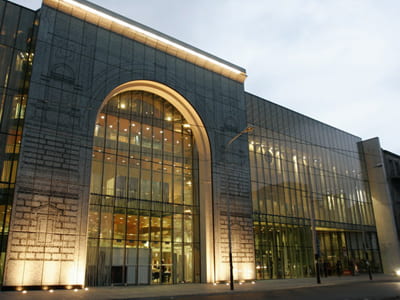 The Arthur Rubenstein Philharmonic in Łódź is installing a new organ in its facilities—in fact, it will be not one but two independent instruments, of the Baroque and Romantic styles. According to the Philharmonic representatives, it will be an innovative project on an international scale. Installation will begin during the summer 2012 and the project is slated for completion by the end of 2014. In February of 2015, the Łódź Philharmonic will celebrate its 100th anniversary.
The Arthur Rubenstein Philharmonic in Łódź is installing a new organ in its facilities—in fact, it will be not one but two independent instruments, of the Baroque and Romantic styles. According to the Philharmonic representatives, it will be an innovative project on an international scale. Installation will begin during the summer 2012 and the project is slated for completion by the end of 2014. In February of 2015, the Łódź Philharmonic will celebrate its 100th anniversary.
According to Lech Dzierzanowski, the artistic director of the Philharmonic, the Baroque/Romantic organ is a unique project, not only in Poland, but entire world. “There is no concert hall in the world that has two independent organs. It gives a possibility of performing both ancient and romantic music while maintaining all the stylistic characteristics of those musical periods” – claims Dzierzanowski.
According to the plan, the Baroque organ will be built first, in 2013, and will occupy the middle part of the wall behind the stage. “We hope that the organ will sound for the first time in the Fall of 2013” says Dzierzanowski. During the following summer the Romantic organ will be finished, and will consist of two parts, place on both sides of the Baroque organ. The most time-consuming part of the whole process will be intonation and tuning, which will be completed by the end of 2014.
According to Dzierzanowski, the number of organs in Poland is still relatively small compared to, for example, Belgium. “Our instrument will have also a pedagogical purpose. It will be easily available for student for practice” – says Dzierzanowski.
The cost will reach 12 million zloty – the project will be co-financed by European Fund for Regional Development and Łódź Philharmonic’ budget.
[Source: rmfclassic.pl]
Chopin Conference IX
 A hooded rogue, a romantic lover, or an ardent patriot… the functional form of Chopin and his music in contemporary culture is one of the themes of the 9th Chopin Conference, which takes place on December 1-2, 2011 in Warsaw. The aim of this year’s conference, whose slogan is “2010. Postscript,” is a summary of the 2010 Chopin Year celebrations. The organizer of the two-day meeting is the Fryderyk Chopin Institute (NIFC). The Program Board of this year’s conference consists of: Prof. Irena Poniatowska, Prof. Mieczysław Tomaszewski , Dr. Maciej Jabłoński, and Grzegorz Michalski.
A hooded rogue, a romantic lover, or an ardent patriot… the functional form of Chopin and his music in contemporary culture is one of the themes of the 9th Chopin Conference, which takes place on December 1-2, 2011 in Warsaw. The aim of this year’s conference, whose slogan is “2010. Postscript,” is a summary of the 2010 Chopin Year celebrations. The organizer of the two-day meeting is the Fryderyk Chopin Institute (NIFC). The Program Board of this year’s conference consists of: Prof. Irena Poniatowska, Prof. Mieczysław Tomaszewski , Dr. Maciej Jabłoński, and Grzegorz Michalski.
A detailed program can be found on the website: en.chopin.nifc.pl/conferences/year/2011
[Sources: rmfclassic.pl, en.chopin.nifc.pl]
Maria Szymanowska In Paris: A Report
by Maja Trochimczyk (reprinted with permission)
Who was Maria Szymanowska? A cousin of composer Karol Szymanowski? Her name would be known to pianists and music historians specializing in romantic music, but she remains unnoticed by the general public. Born in 1789 in Warsaw, Szymanowska’s came from the family of Wołowskis, but used her husband’s name professionally during her European concert tours, even though she divorced him in 1820s. Her career as a virtuoso pianist was initiated with a short travel to Paris in 1810, and continued afterwards. Szymanowska was one of the most important Polish virtuosi of the first half of the 19th century, and also a composer who wrote in the delightful stile brilliant of her contemporaries, such as Kalkbrenner or Hummel and early Chopin of the Piano Concerti. Her music was divided into two streams: virtuoso pieces for concert stages (etudes, polonaises, and variations), and music for home use, such as songs (including several Historical Chants to texts by Julian Ursyn Niemcewicz) and salon dances. She wrote about 120 pieces and helped establish the genres of romantic piano music, such as mazurkas, polonaises, nocturnes, and etudes. As the first female pianist who supported herself and her family with her concerts and lessons, she performed several times in London and Paris; she also toured Germany, Italy, and Russia before settling in 1827 in St. Petersburg. Since l822, she was recognized as the Court Pianist of the Tsarinas (the Tsar’s wife and mother) and she decided to settle in the capital of the empire, because it offered the best prospects for revenue from teaching the children of the aristocracy.
In the last years of her life, Szymanowska maintained a well-known literary and musical salon, which grouped aristocratic, literary and artistic figures – crème de crème of the Petersburg society. Her salon was also open to Poles living in St. Petersburg and was for them a second home, an oasis of Polish language and culture. Performances in the salon included music-and-poetry evenings featuring the genre of the “melodrama” – where poems are recited or improvised to musical accompaniment. Szymanowska also staged many “tableaux vivant” – which interpreted scenes from Polish and Russian literature. Her guests included Aleksander Puszkin and Adam Mickiewicz, whose inspired improvisations to Szymanowska’s accompaniment were the main attraction for numerous evenings. She also composed songs to Mickiewicz’s poetry, and he wrote a poem for her, “the Queen of tones” (Their correspondence is discussed in a study by Grzegorz Szelwach published by PIASA in 2006).
To this poetic background, we should add the fact that Johann Wolfgang von Goethe considered Szymanowska the living embodiment of Das Ewig Weiblich, or the “eternal feminine” and he dedicated to her one of his last and most important poems, Aussöhnung. You can find out more about Szymanowska from a book by Slawomir Dobrzanski illustrated with his recording of selected pieces by this forgotten composer (published by the Polish Music Center in Los Angeles in 2007; I contributed a chapter on Szymanowska’s songs) and from a new, annotated bibliography by Anna Kijas (2010) that documents the discovery of important, hitherto unknown source materials, in addition to reviewing all available publications about Szymanowska.
The neglect of Szymanowska as a subject of serious study is coming to an end. Initiated, planned and organized by singer Elżbieta Zapolska, the President of the Maria Szymanowska Society, the First International Maria Szymanowska Conference took place in Paris on September 30 and October 1, 2011. The conference proceedings will be published in the annual journal of the Polish Academy of Sciences’ Scientific Station in Paris, one of the co-sponsors of this important event. The Minister of Culture and National Heritage bestowed on this conference its honorary patronage and the sponsors and co-organizers included all major Polish institutions in Paris: The Historical-Literary Society/Polish Library, that organized a fascinating exhibition about Szymanowska and her times, as well as hosted the conference during its first day; the Polish Institute, that took care of the participants; and the Scientific Center of the Polish Academy of Sciences, the organizer of the second day of the conference. That day ended with a recreation of a Maria Szymanowska salon, featuring music and poetry performed by the participants in the symposium. Polish partners of this international project included also the Adam Mickiewicz Museum of Literature in Warsaw, Poland, where the majority of Szymanowska sources is found; she was a friend of the poet who later married her daughter.
The symposium is one of the main elements in Elżbieta Zapolska’s project, Maria Szymanowska (1789-1831), A Woman of Europe, which will also include the release of a CD with all of Szymanowska’s songs (Acte Prealable). Of the invited scholars Slawomir Dobrzanski did not come because he was, at the same time, recording his CD with complete piano and chamber music by Szymanowska that will be released in the spring of 2012. The impressive group of scholars from around the world gathered in Paris included representatives of Poland, France, USA, Russia and Sweden (for a full program, visit muzeumliteratury.pl). The first day of the symposium took place in the Polish Library on an island near the Notre Dame cathedral. The exhibition dedicated to Maria Szymanowska featured fascinating items from the collections of the Historical-Literary Society, such as previously unknown portraits of Szymanowska and her family, portraits of individuals from her artistic circle, first edition of her works, manuscripts and even personal items, such as satin slippers worn with evening gowns and precious jewelry. To see things that so insolently dare to outlive their owners has always filled me with melancholy. I was comforted at the second exhibition at the Polish Library, dedicated to Adam Mickiewicz and his cultural environment, where one can see an astoundingly beautiful, literally unknown portrait of Szymanowska as a Roman goddess, in the company of a putto, painted by Walenty Wańkowicz. I have been very interested in this portrait because of the topic of my own paper, discussing the self-representation of Szymanowska as an artist and a lady. She “created” herself as a true stylist and image-maker of the 19th century. Thanks to this image, and not only to her piano talent, she became the court pianist of the Russian Empire and the teacher of countesses and princesses.
The symposium started from a lecture by Anna Czarnocka (Historical-Literary Society in Paris) who discussed the archival materials associated with Maria Szymanowska in the holdings of the Polish Library. These materials were featured at the exhibition curated by Ms. Czarnocka and also in an extensive color catalogue. Prof. Irena Poniatowska (National Fryderyk Chopin Institute in Warsaw) introduced the composer as a “Grande dame of Polish music” and discussed, among other topics, her influence on Chopin and contribution to the development of genres of etude and solo song. French singer and musicologist, Florence Launay (author of an extensive study of French female composers of the 19th century) introduced the music and biography of Sophie Gail (1775-1819), a singer and composer from the times of Empire and Restoration. Maria Rose van Epenhuysen (Dutch-American pianist and musicologist) discussed the life and four stylistical periods in the music of a French composer-pianist Hélène de Montgeroult (1764-1836), a talented aristocrat who survived the Revolution, lectured at the Paris Conservatoire and wrote songs and piano music. We heard the music by Gail and de Mongeroult during the evening concert, in the context of contemporary works by Francois-Andrien Boieldieu and Jan Ladislav Dusek, who was de Montgeroult’s teacher. During the discussion about early female composers I informed my colleagues about the discovery of more than a dozen of Polish women composers of the 19th century whose life and work remains still unknown. Some of these composers belonged to the creative circle around Duchess Maria Czartoryska-Wirtemberska, a patriot and writer. Maria Wirtemberska was the sponsor of the project of Historical Chants written by Julian Ursyn Niemcewicz and set to music in 1816 by a group of composers, including also Maria Szymanowska and Princess Zofia Zamojska. During the conference, musical interludes were provided by eminent pianist and musicologist Jean-Pierre Armengaud.
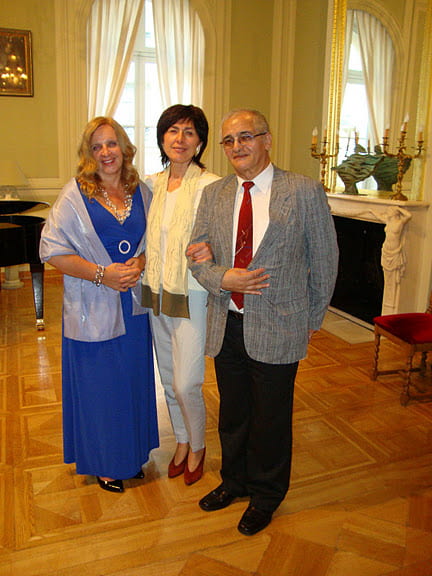 The symposium continued on October 1, 2011 in the palatial ballroom of the Paris Station of the Polish Academy of Sciences, the centerpiece of an elegant palace purchased by the Polish government in 1946. Adam Gałkowski (historian from the University of Warsaw) discussed the history of the family Wołowski, discussing its links to the Frankist sect and the branch of the family that emigrated to France in the 1830s. Ewa Talma-Davous (Polish-French musicologist) discussed the history of the friendship between Szymanowska and Pierre Baillota, a French violinist and composer; she illustrated her lecture with letters and music that was previously unknown. Dr. Benjamin Vogel, expert in the history of romantic pianos talked about Szymanowska’s preference for instruments, based on the documentation from piano maker archives and portraits of the pianists with instruments. One source was her portrait by Aleksander Kokular painted in 1825 in Rome, with an impossible keyboard, spanning seven octaves. Another source was factory books of John Broadwood & Sons in London, where Szymanowska bought a piano in 1826. Pianist Jean-Pierre Armengaud presented a long study of Szymanowska’s compositional and pianistic technique, illustrating his ideas with musical fragments. He focused, among other issues, on the influence of Szymanowska on Chopin. Elena Gretchnaia (literature professor representing both the Academy of Sciences in Moscow and the University of Orlean) studied the Russian artistic circles of Szymanowska, based on the inscriptions in her famous “Sztambuchy” [Manuscript books]. I talked about the artistic, intellectual and social image that Szymanowska created for herself and that was recorded in a series of her portraits, an important iconographic source. Her elegant but modest dresses and hairstyles were modeled on the style of aristocratic ladies of France and Russia, such as Duchesses Golicyna and Wołkońska, Countess de Berry and Tsarina Alexandra Feodorovna, the wife of Nicolas I.
The symposium continued on October 1, 2011 in the palatial ballroom of the Paris Station of the Polish Academy of Sciences, the centerpiece of an elegant palace purchased by the Polish government in 1946. Adam Gałkowski (historian from the University of Warsaw) discussed the history of the family Wołowski, discussing its links to the Frankist sect and the branch of the family that emigrated to France in the 1830s. Ewa Talma-Davous (Polish-French musicologist) discussed the history of the friendship between Szymanowska and Pierre Baillota, a French violinist and composer; she illustrated her lecture with letters and music that was previously unknown. Dr. Benjamin Vogel, expert in the history of romantic pianos talked about Szymanowska’s preference for instruments, based on the documentation from piano maker archives and portraits of the pianists with instruments. One source was her portrait by Aleksander Kokular painted in 1825 in Rome, with an impossible keyboard, spanning seven octaves. Another source was factory books of John Broadwood & Sons in London, where Szymanowska bought a piano in 1826. Pianist Jean-Pierre Armengaud presented a long study of Szymanowska’s compositional and pianistic technique, illustrating his ideas with musical fragments. He focused, among other issues, on the influence of Szymanowska on Chopin. Elena Gretchnaia (literature professor representing both the Academy of Sciences in Moscow and the University of Orlean) studied the Russian artistic circles of Szymanowska, based on the inscriptions in her famous “Sztambuchy” [Manuscript books]. I talked about the artistic, intellectual and social image that Szymanowska created for herself and that was recorded in a series of her portraits, an important iconographic source. Her elegant but modest dresses and hairstyles were modeled on the style of aristocratic ladies of France and Russia, such as Duchesses Golicyna and Wołkońska, Countess de Berry and Tsarina Alexandra Feodorovna, the wife of Nicolas I.
The Maria Szymanowska Symposium ended with an improvised concert – reproducing in modern times an evening in Maria Szymanowska’s salon. The evening, planned and hosted by the organizer of the Symposium, Elżbieta Zapolska, featured scholars as musicians, singers, and poets. Elżbieta Zapolska, Maria Rose and Florence Launay played and sang vocal and piano music by Szymanowska, Gail, Boieldieu and Field. Highlights included the Ballade Alpuhara accompanied by the French translation of the text and the Desdemona’s Romance from Shakespeare’s Othello, with original and French texts. Maria Rose recited Goethe in German, Benjamin Vogel read Mickiewicz’s poem notated in her Sztambuch in Polish and I read three of my own poems in English dedicated to Chopin (from the anthology Chopin with Cherries, 2010), Mickiewicz (Ode of the Lost), and Szymanowska.
The first international symposium about Maria Szymanowska brought much new information about her, and helped better understand her achievements in the context of Polish, French and Russian culture of the first half of the 19th century. Scholars discussed poetry, music, painting, and the genealogy of Szymanowska’s family, but even the fashion history attracted scholarly attention, as befits an event held in Paris during the October Fashion Week 2011.
[Sources: open.salon.com, Photos: by Maja Trochimczyk via picasaweb.google.com]
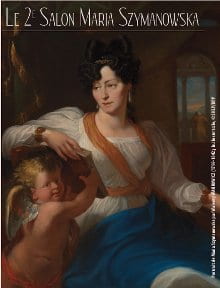 In celebration of the 222nd birth anniversary of Szymanowska, the Maria Szymanowska Society will hold the 2nd Salon of Maria Szymanowska on December 14, 2011 in Paris’s 4th district Town Hall. Performers include: comedienne Monique Stalens, soprano Florence Launay, mezzo-soprano Elisabeth Zapolska, and pianists Małgorzata Kluźniak-Celińska and Jean-Pierre Armengaud. The program will include works by Maria Szymanowska, Sophie Gail, Claude Debussy, Arthur Lourié and Dmitri Chostakovitch.
In celebration of the 222nd birth anniversary of Szymanowska, the Maria Szymanowska Society will hold the 2nd Salon of Maria Szymanowska on December 14, 2011 in Paris’s 4th district Town Hall. Performers include: comedienne Monique Stalens, soprano Florence Launay, mezzo-soprano Elisabeth Zapolska, and pianists Małgorzata Kluźniak-Celińska and Jean-Pierre Armengaud. The program will include works by Maria Szymanowska, Sophie Gail, Claude Debussy, Arthur Lourié and Dmitri Chostakovitch.
Szmytka / Polish Song In Brussels
 On December 12, soprano Elżbieta Szmytka (pictured above) and pianist Levente Kende will present a recital entitled “Parle-moi encore” at the Théâtre Royal de la Monnaie in Brussels. The program is comprised of works by Karol Szymanowski, Fryderyk Chopin and Mieczysław Karłowicz—to see the full program, visit www.culturepolonaise.eu. The evening before the recital, Szmytka will give young singers a master class on performing Polish melodies. This event is part of the International Cultural Programme of the Polish EU Presidency.
On December 12, soprano Elżbieta Szmytka (pictured above) and pianist Levente Kende will present a recital entitled “Parle-moi encore” at the Théâtre Royal de la Monnaie in Brussels. The program is comprised of works by Karol Szymanowski, Fryderyk Chopin and Mieczysław Karłowicz—to see the full program, visit www.culturepolonaise.eu. The evening before the recital, Szmytka will give young singers a master class on performing Polish melodies. This event is part of the International Cultural Programme of the Polish EU Presidency.
From the theater’s website:
Chopin’s name is indissociable from the virtuoso literature for piano which he composed. However, he also wrote melodies often inspired by the popular poetry of his compatriot Stefan Witwicki. In his melodies, Chopin opted for a simple musical language, interspersed with Polish dances. Szymanowski’s melodies are clearly rooted in 19th century tradition, but are also influenced by the exoticism and orientalism which were so characteristic of the European art scene at the turn of the century. His melodies based on Polish texts are little gems of refinement, interspersed with unexpected rhythmic and harmonic changes. The art of Polish melody will also be highlighted via the neo-romantic musical language of Mieczysław Karłowicz. Elżbieta Szmytka and Levente Kende – who have performed on stage at La Monnaie in the past – have more than deserved their international success.
Monday December 12, 2011 | 8:00
“Parle-moi encore” – a recital of Polish music
Théâtre Royal de la Monnaie
Place de la Monnaie – 1000 Brussels, Belgium
[Sources: bozar.be, culturepolonaise.eu]
Penderecki In Berlin
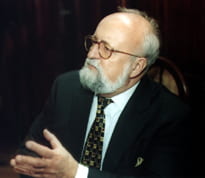 Radialsystem V in Berlin is hosting a concert of Krzysztof Penderecki’s a capella choral works, preceded by a panel discussion with the composer. The project, entitled “Penderecki – a capella”, is a presentation of the greatest choral works of one of Poland’s most renowned, living contemporary composers, Krzysztof Penderecki. The program will be performed by the Polish Chamber Choir.
Radialsystem V in Berlin is hosting a concert of Krzysztof Penderecki’s a capella choral works, preceded by a panel discussion with the composer. The project, entitled “Penderecki – a capella”, is a presentation of the greatest choral works of one of Poland’s most renowned, living contemporary composers, Krzysztof Penderecki. The program will be performed by the Polish Chamber Choir.
Penderecki’s choral works are considered to be consistent with his style, but offer a different manner of expression. During the discussion panel preceding the concert, audiences will have an opportunity to interact with the composer and speak about his works. The panel will be moderated by Moritz Puschke, a German specialist in choral music.
The Polish Chamber Choir was founded in 1978 by Ireneusz Łukaszewski and is currently under the direction of Jan Łukaszewski, the founder’s brother, who took over in 1983. The choir has performed with various orchestras and musical groups around the world like the Sinfonia Varsovia, the Polish National Radio Symphony Orchestra in Katowice, the Academy of Ancient Music (UK), Concilium Musicum Wien, and more. Most recently, the choir has recorded a CD of Penderecki’s choral works entitled “Penderecki: Complete Choral Works” (DUX 2009).
This project has been co-financed by the Polish Ministry of Culture and National Heritage.
December 3rd, 2011| Panel discussion – 7:00pm, Concert – 8:00pm
Penderecki – a capella
Radialsystem V
Holzmarktstraße 33, Berlin, Germany
[Source: culture.pl]
NOSPR Martial Law Memorial Concert
 The National Polish Radio Symphony Orchestra (NOSPR) will present a “Concert in memory of victims of martial law” on December 13. Performing with the orchestra will be the Choir of the Śląsk Philharmonic, Camerata Silesia, and conductor Jerzy Maksymiuk. The program will feature Wojciech Kilar’s Exodus and Ludwig van Beethoven’s Symphony No. 3 Eroica.
The National Polish Radio Symphony Orchestra (NOSPR) will present a “Concert in memory of victims of martial law” on December 13. Performing with the orchestra will be the Choir of the Śląsk Philharmonic, Camerata Silesia, and conductor Jerzy Maksymiuk. The program will feature Wojciech Kilar’s Exodus and Ludwig van Beethoven’s Symphony No. 3 Eroica.
For more information about December 1981and official events surrounding the 30th anniversary of the introduction of martial law, visit grudzien81.pl.
December 13, 2011 | 5:30 p.m.
Concert in memory of victims of martial law
Cathedral of Christ the King
Plebiscytowa 49A Katowice, Poland
[Source: nospr.org.pl]
Kwadrofonik At Kraków Phil
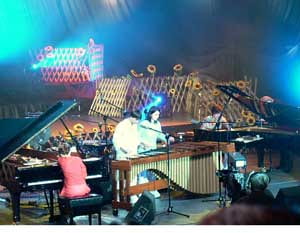 On December 12, the ensemble Kwadrofonik—a fusion between the Lutosławski Piano Duo and Hob-Beats percussion duo—will perform at the Hall of the Kraków Philharmonic. Kwadrofonik is comprised of Emilia Sitarz – piano, Bartłomiej Wąsik – piano, Magdalena Kordylasińska – percussion, and Miłosz Pękala – percussion. The program will include Karol Szymanowski – The selections from the ballet Harnasie op. 55 and Witold Lutosławski – Variations on a theme of Paganini, as well as Igor Stravinski – Rite of Spring.
On December 12, the ensemble Kwadrofonik—a fusion between the Lutosławski Piano Duo and Hob-Beats percussion duo—will perform at the Hall of the Kraków Philharmonic. Kwadrofonik is comprised of Emilia Sitarz – piano, Bartłomiej Wąsik – piano, Magdalena Kordylasińska – percussion, and Miłosz Pękala – percussion. The program will include Karol Szymanowski – The selections from the ballet Harnasie op. 55 and Witold Lutosławski – Variations on a theme of Paganini, as well as Igor Stravinski – Rite of Spring.
[Source: filharmonia.krakow.pl ]
Penderecki in L.A.
On December 11, the Colburn Chamber Music Society presents violinists Jennifer and Laura Frautschi with Colburn Conservatory Faculty and other selected students performing Penderecki’s Serenade. Also on the program are Mendelssohn’s String Quintet in A Major and Bruch’s Octet in B-flat Major.
Sisters and violinists Jennifer and Laura Frautschi, alumni from the Colburn School of Performing Arts, have garnered acclaimed and awards including Avery Fisher grants. They have performed with the Los Angeles Philharmonic, Chicago Symphony Orchestra, and Lincoln Center. Both studied at Juilliard with Robert Mann, past longtime first violinist of the famed Juilliard Quartet.
Sunday, December 11, 2011 | Talk – 2:00pm, Concert – 3:00pm
Colburn Chamber Music Society Recital featuring Penderecki
The Colburn School – Zipper Concert Hall
200 South Grand Ave., Los Angeles CA
Info & tickets: www.colburnschool.edu
[Source: Clickable Chamber Music Newsletter]
Awards
ICMA Award Nominations
The Jury of the International Classical Music Awards (ICMA) has nominated a total of 214 CDs and DVDs for their 2012 Awards. The laureates of this prestigious award will be announced on February 20, 2012. The awarding ceremony will take place on May 15, 2012 in Nantes, France. The gala concert will be performed by the Orchestre National des Pays de la Loire under the baton of John Axelrod. The concert will be broadcast by France Musique and several radio stations.
Among the nominated recordings are many Polish composers, musicians, and ensembles:
Choral Category:
Schumann: Faustszenen WoO 3
I. Hossa, Ch. Libor, A. Lubanska, E. Marciniec, D. Kirch, J. Kortekangas, A. Gangestad, Warsaw Philharmonic Choir and Orchestra & Warsaw Boys’ Choir, A. Wit
Naxos 8 572430-31
Opera Category:
Dvorak: Rusalka
P. Beczala, C. Nylund, E. Magee, B. Remmert, D. Schmutzhard, Vienna State Opera Chorus & The Cleveland Orchestra, Fr. Welser-Möst
Orfeo C 792 113 D
Weber: Euryanthe
M. Diener, H. Juntunen, J. Mac Master, St. Gadd, W. Gierlach, Polish Radio Choir Cracow, Choir of the Podlasie Opera and Philharmonic in Białystok, Polish Radio Symphony Orchestra, L. Borowicz
Polskie Radio PRCD 1354-1356
Solo Instrument Category:
Tansman : 24 Intermezzi, Petite Suite
E. Reyes
Naxos 8. 572266
Chopin: The Complete Valses, Nocturne No. 2
S. Hough
Hyperion CDA 67849
Chamber Music Category:
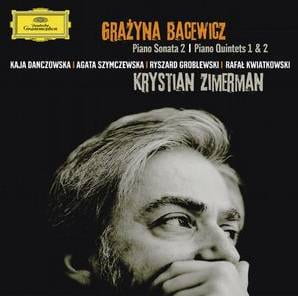 Bacewicz: Piano Quintet No. 1 & 2, Piano Sonata No. 2
Bacewicz: Piano Quintet No. 1 & 2, Piano Sonata No. 2
K. Zimerman, K. Danczowa, A. Szymczewska, R. Groblewski, R. Kwiatkowski
Deutsche Grammophon 4778332
Penderecki: String Quartets, String Trio, Clarinet Quartet
Dafo String Quartet, A. Adamski
Dux 770
Concertos Category:
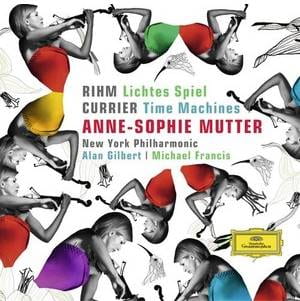 Paderewski : Piano Concerto “Fantaisie polonaise sur des themes originaux”
Paderewski : Piano Concerto “Fantaisie polonaise sur des themes originaux”
K. Kenner, Orchestra of Podlasia and Bialystok, M. Nalecz-Niesiolowski
Dux 733
Contemporary Category:
Penderecki: Duo concertante per violino e contrabbasso – Currier: Time Machines – Rihm: Lichtes Spiel, Dyade für Violine und Kontrabass
A.S. Mutter, R. Patkolo, New York Philharmonic, A. Gilbert, M. Francis
Deutsche Grammophon 4779359
H.M. Górecki: The Three String Quartets
Royal String Quartet
Hyperion CDA67812
Penderecki: Viola Concerto, Cello Concerto No. 2
G. Zhislin, T. Vassiljeva, Warsaw Philharmonic, A. Wit
Naxos 8.572 211
DVD Performance Category:
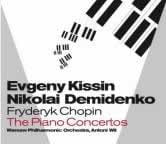 Chopin: The Piano Concertos (Chopin: Piano Concertos Nos. 1 & 2)
Chopin: The Piano Concertos (Chopin: Piano Concertos Nos. 1 & 2)
N. Demidenko, E. Kissin, Warsaw Philharmonic Orch., A. Wit
Accentus Music ACC10202B
Szymanowski: Symphonies Nos. 3 & 4
J. K.Broja, R. Bartminski, Warsaw Philharmonic & Choir, A. Wit
ICA Classics 5017
Weinberg: The Passenger
M. Breedt, R. Saccà, Vienna Symphony, T. Currentzis
Neos 51006
DVD Documentaries Category:
Pelléas et Mélisande: Le Chant des Aveugles
Film by Philippe Béziat
S. Marin-Degor, J.S. Bou, M. Minkowski, O. Py
Naïve ND 68569
[Sources: beethoven.org.pl, icma-info.com]
Wrocław Music & Theatre Awards
Composer Rafał Augustyn was among the awardees of this year’s Wrocław Music and Theatre Awards. The joint prize winners’ ceremony took place on Monday, November 21, 2011 at the Contemporary Theatre in Wrocław.
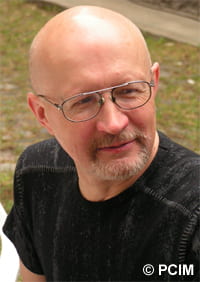 Rafał Augustyn received the prize in the category “classical music” for the CD Do Ut Des, Music for and with Quartet (CD Accord 165)– a very intriguing collection of pieces, which shows the composer’s diverse personality and the evolution of his musical language. The band Me, Myself and I, won the “pop music” category for their debut album ‘Takadum “, a work full of joy, tight, and meticulously executed by the musicians. Winner of the Wroclaw Theatre Prize was Agata Kucińska, who brought to the world stage a complete, coherent artistic vision and versatility with the play “Żywotach świętych osiedlowych.”
Rafał Augustyn received the prize in the category “classical music” for the CD Do Ut Des, Music for and with Quartet (CD Accord 165)– a very intriguing collection of pieces, which shows the composer’s diverse personality and the evolution of his musical language. The band Me, Myself and I, won the “pop music” category for their debut album ‘Takadum “, a work full of joy, tight, and meticulously executed by the musicians. Winner of the Wroclaw Theatre Prize was Agata Kucińska, who brought to the world stage a complete, coherent artistic vision and versatility with the play “Żywotach świętych osiedlowych.”
The other nominees in the classical music category were: Tomasz Dobrzanski, artistic director of the “Forum Musicum” Festival, for his consistent and accessible way of presenting ancient music; composer Cezary Duchnowski for presenting his “visionary concept of contemporary opera” on the stage of Wrocław Opera; Paul McCreesh, artistic director of Wratislavia Cantans for preparing and leading performance of oratorio Grande Messe de Mortes, which was performed by the choir and orchestra of Wroclaw Philharmonic with help of other ensembles; Wrocław Chamber Orchestra LEOPOLDINUM for outstanding recording of works by Hanna Kulenty (DUX 0823, May 2011).
Learn more about all of the nominees at wroclaw.pl.
[Sources: polmic.pl, pik.wroclaw.pl]
Festivals
New Actus Humanus Festival
 The first edition of the Actus Humanus Festival will take place in Gdańsk from December14-18, 2011. Its goal is to offer audiences true masterpieces of early music linked with the Christmas season, played by the world’s leading performers of historic music. Carefully selected repertoire and the presence of unquestionable authorities of early music will put Gdańsk on the map of the early music cultural heritage. From the beginning, Actus Humanus aspires to become one of leading European festivals devoted to Renaissance and Baroque music.
The first edition of the Actus Humanus Festival will take place in Gdańsk from December14-18, 2011. Its goal is to offer audiences true masterpieces of early music linked with the Christmas season, played by the world’s leading performers of historic music. Carefully selected repertoire and the presence of unquestionable authorities of early music will put Gdańsk on the map of the early music cultural heritage. From the beginning, Actus Humanus aspires to become one of leading European festivals devoted to Renaissance and Baroque music.
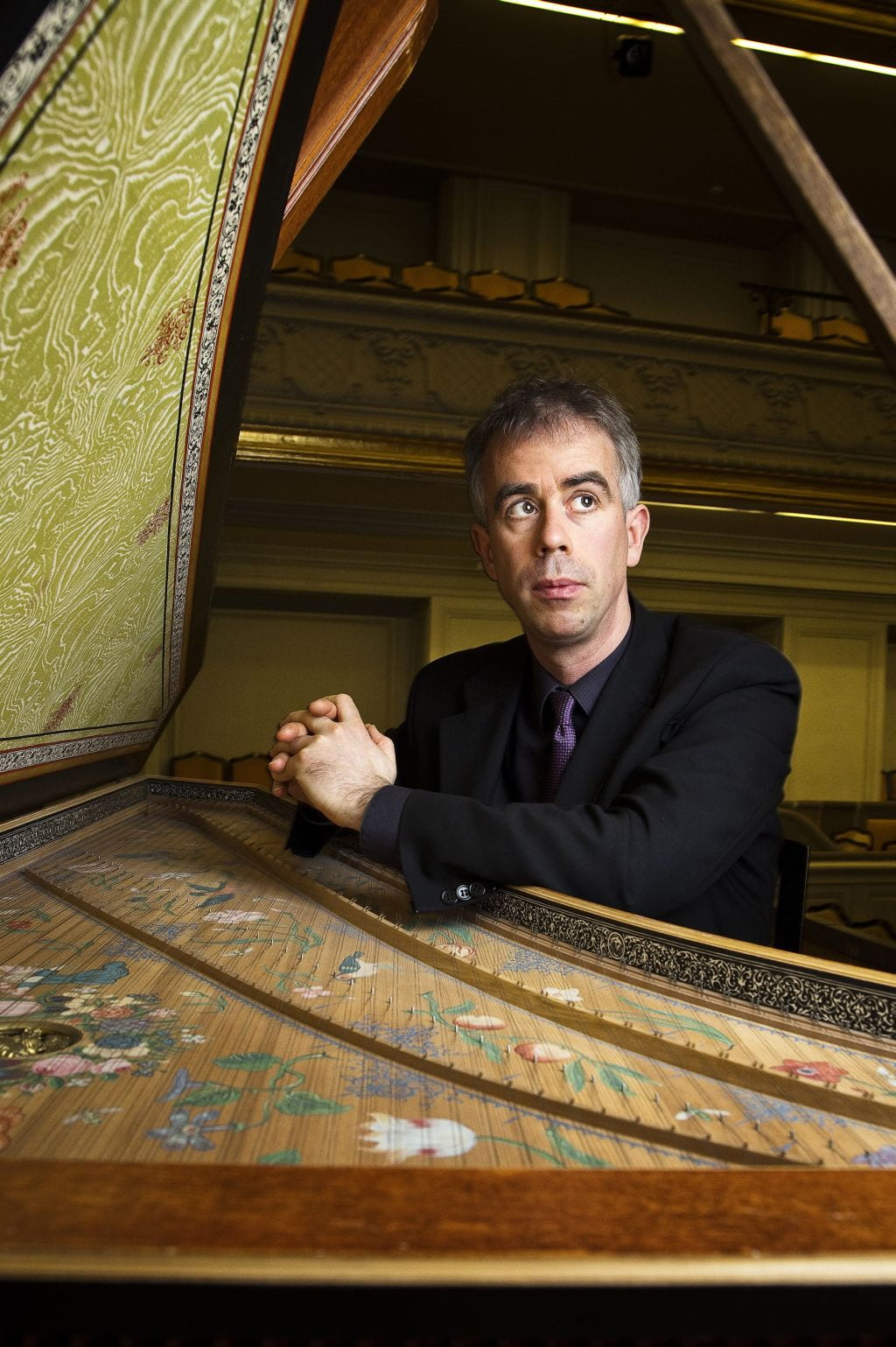
This year’s opening concert, held at St. Nicolas’ Church, will feature one of the most beautiful—but unfairly forgotten—masterpieces of the Italian Baroque, Cinque Profeti – Cantata per la Notte di Natale by Alessandro Scarlatti, performed by the sensational Italian ensemble La Venexiana conducted by founder and countertenor, Claudio Cavina. The following day, Patrizia Bovi and Ensemble Micrologus, featuring a guest performance of one of the most original male voices, Pino de Vittorio, will play a unique Medieval Christmas program entitled “In Festa Nativitatis” at St. Bridget’s Church. Then will come the Festival’s centerpiece in the form of the French “Noël Renaissance – ‘O’ de l’avent,” performed by Ensemble Clément Janequin under Dominique Visse at St. James’ Church. On Saturday, the interiors of the historic Artus Court will fill with the music of Johann Sebastian Bach (including the Goldberg Variations) and of Domenico Scarlatti performed by Pierre Hantaï (pictured at left), the legendary French harpsichord player. The final concert, also at the Artus Court, will return audiences to Italy with a Baroque program—under their sensational maestro and founder Federico Maria Sardelli, Modo Antiquo with Norwegian tenor Magnus Staveland will present virtuoso interpretations of Antonio Vivaldi’s concertos and a selection of his most beautiful arias.
The Actus Humanus Festival is embarking on its maiden voyage. As it continues, the Festival will expand its agenda and consolidate its position by boldly exploring new phenomena at the worldwide stage of the early music. The following performers have already confirmed their participation in the next year’s event: Le Poème Harmonique with Vincent Dumestre, Orfeo 55 with Nathalie Stutzmann, Akadêmia with Françoise Lasserre, Mala Punica with Pedro Memelsdorff and Europa Galante with Fabio Biondi.
[Sources: actushumanus.com, Photo: Philippe Matsas via culture.pl]
Performances
Górecki Shines At Jacaranda
A review by Krysta Close
 On Saturday, November 19 (as well as Sunday, November 20), the Jacaranda music series produced another excellent concert featuring some of L.A.’s most talented musicians. Subtitled “Music at the Edge,” the Jacaranda series is truly at it best when presenting challenging programs of rarely-heard music with such ease and grace that even the most unfamiliar of listeners feels comfortable and yet intrigued, and the “Song of Stones” program was no exception.
On Saturday, November 19 (as well as Sunday, November 20), the Jacaranda music series produced another excellent concert featuring some of L.A.’s most talented musicians. Subtitled “Music at the Edge,” the Jacaranda series is truly at it best when presenting challenging programs of rarely-heard music with such ease and grace that even the most unfamiliar of listeners feels comfortable and yet intrigued, and the “Song of Stones” program was no exception.

On this occasion, the large sanctuary of First Presbyterian Church in Santa Monica was filled entirely with the music of Henryk Mikołaj Górecki (1933-2010), marking the one year death anniversary of this giant of Polish contemporary music. While the composer had gained international fame primarily through the chart-topping success of his Third Symphony, Jacaranda’s “Song of Stones” program instead focused the spotlight on the wider range of Górecki’s oeuvre, presenting works in various chamber settings from an almost 40 year span.
After Jacaranda’s Artistic Director Patrick Scott gave a brief introduction—the contents of which were fleshed out with excellent detail in the lengthier program notes—the concert began at the beginning, with Op. 1. Performing the young works of any composer can be challenging but pianist Mark Robson was never apologetic in his performance of the Four Preludes (1955) and, as soon as Robson took command of the keys, music filled every corner of the wide open sanctuary. While at moments it seemed like he was tossing off the delicate music, it was never with disregard, but rather as if he was flinging these rare gems out into the world, demanding that they be heard and appreciated. Robson’s muscular approach gave strength to the fluid and showy runs of the fourth Prelude and, overall, his sense of weight and build helped provide a through line for the entire work. By the end, the audience had a sense of the emotional range that Górecki could pack into 8 minutes of solo piano music, as well as the attention that we would need to give in order to catch every witty musical nuance of the rest of the program.
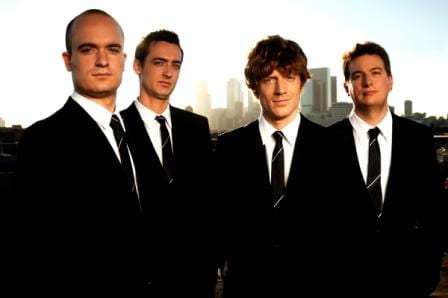 Next, the Calder Quartet took the stage for their Jacaranda debut, performing the String Quartet No. 2 Quasi una Fantasia, Op. 64 (1991). Having formed at the USC Thornton School of Music and then gone on to studies and residencies at the Colburn School and Juilliard School, it is no doubt why this ensemble has become a darling of the L.A. chamber music scene. As talented as they are as individuals —violinists Benjamin Jacobson and Andrew Bulbrook, violist Jonathan Moerschel, and cellist Eric Byers—they displayed a beautifully balanced interplay between members and a completely unified reverence for the music at hand.
Next, the Calder Quartet took the stage for their Jacaranda debut, performing the String Quartet No. 2 Quasi una Fantasia, Op. 64 (1991). Having formed at the USC Thornton School of Music and then gone on to studies and residencies at the Colburn School and Juilliard School, it is no doubt why this ensemble has become a darling of the L.A. chamber music scene. As talented as they are as individuals —violinists Benjamin Jacobson and Andrew Bulbrook, violist Jonathan Moerschel, and cellist Eric Byers—they displayed a beautifully balanced interplay between members and a completely unified reverence for the music at hand.
Like the famous Third Symphony (1976), Górecki begins his Second String Quartet with a haunting throb in the low strings, which remain as the emotional core throughout the piece. Although the viola sounded tinny at times, especially in the secco bars of the opening theme, it was balanced out by the gorgeous tone of the violins and the warm consistency of the cello and, by the return of the opening theme in last movement, the viola tone had rounded out to match that of his partners. Górecki provides moments of such rhythmic jauntiness and harmonic transcendence throughout the four-movement work and yet never lets the listener move far away from the source of pain that seems to drive the music; the Calder Quartet proved to be a powerful and adept guide on this emotional journey.
 After intermission, the Lyris Quartet took the stage for Górecki’s String Quartet No. 1 Już się zmierzcha [Already it is Dusk], Op. 62 (1988). This challenging work may have entered Lyris’s repertoire through their cellist, Timothy Loo, who performed it splendidly as a member of the Denali Quartet at the 2009 Paderewski Lecture-Recital (Los Angeles) and Paderewski Festival (Paso Robles). While Lyris did not display quite the same passionate engagement that Denali had in 2009, or Calder had earlier in the Second Quartet, the group’s warm sound brought out the poetic qualities of work’s strophic structure. Playing as if a single unit, violinists Alyssa Park and Shalini Vijayan, violist Luke Maurer and cellist Loo also provided an overpowering wall of sound during the most strident moments of this driven piece of music.
After intermission, the Lyris Quartet took the stage for Górecki’s String Quartet No. 1 Już się zmierzcha [Already it is Dusk], Op. 62 (1988). This challenging work may have entered Lyris’s repertoire through their cellist, Timothy Loo, who performed it splendidly as a member of the Denali Quartet at the 2009 Paderewski Lecture-Recital (Los Angeles) and Paderewski Festival (Paso Robles). While Lyris did not display quite the same passionate engagement that Denali had in 2009, or Calder had earlier in the Second Quartet, the group’s warm sound brought out the poetic qualities of work’s strophic structure. Playing as if a single unit, violinists Alyssa Park and Shalini Vijayan, violist Luke Maurer and cellist Loo also provided an overpowering wall of sound during the most strident moments of this driven piece of music.
The final treat on this varied menu of a concert was a performance of Kleines Requiem fur eine Polka, Op. 66 (1993) by the Jacaranda Chamber Orchestra. As Patrick Scott pointed out in his program notes, the question remains whether Górecki’s requiem is written for an unnamed Polish woman or the 19th century dance form (both represented by the same word in Polish), and this sense of cagey humor certainly pervades the piece, although it is juxtaposed with moments of simple, achingly beautiful melody. Opening with a piano solo performed again by Mark Robson, whose earlier muscular attack had melted into a much gentler but no less convincing touch, he was then joined by the gorgeously pure tone of the first violin—Alyssa Park of the Lyris Quartet—who seemed to play intuitively, barely seeing conductor Mark Alan Hilt, and yet remaining in perfect synchronicity with Robson.
The Kleines Requiem provides such satisfying textural variation—from the sparseness of the opening piano, violin and tubular bells combination, to sections featuring strings, woodwinds and brass, to the clanging explosion of the full chamber orchestra in unison—and this ensemble of excellent soloists were well up to the task. This work also exhibits Górecki’s knack for providing harmonies that the audience can sink into, even when interspersed with jarring dissonances. It was these hauntingly beautiful harmonies that lingered as the audience left the hall for a generous reception provided by the Modjeska Art & Culture Club, celebrating yet another success for the Jacaranda music series.
November: A Month Of Polish Jazz In Chicago
by the Embassy of Poland in Washington, D.C. (re-printed with permission)
On November 2, Consul General Zygmunt Matynia opened the Umbrella Music Festival, themed “European Jazz Meets Chicago.” Created in cooperation with European consulates and Chicago-based cultural institutes, the festival is in its fifth year and has gained much attention and many fans over the past years. Renowned European jazz musicians perform with their U.S. counterparts for an internationally diverse Chicago audience. The two-day festival, held at the Chicago Cultural Center, brought together jazz musicians from Poland, Lithuania, France, the Netherlands, Austria, Italy, Spain, Switzerland, Germany and Sweden, as well as the U.S.
Polish saxophonist Gerard Lebik performed at the EuroJazz festival, as well as at the All Souls’ Jazz Festival, organized annually by the Friends of Cracow Society and Chopin Theater, with the support of the Consul General of Poland in Chicago. The festival’s aim is the promotion of Polish jazz and the beautiful Polish city of Kraków – which has organized its own All Souls’ Jazz fest more than 50 times.
Thirteen artists took part in this year’s festival – including Agnieszka Iwanska, Megitza, Frieda Lee and Eddie Henderson, who entertained large Polish and American audiences until midnight in Chicago’s Chopin Theater.
Chicago Tribune critic Howard Reich wrote, “Inspired by a comparable event in Krakow, Chicago’s All Souls’ fest looks, feels and sounds like no other jazz soiree in [Chicago].”
[Source: washington.polemb.net]
Sinfonia Varsovia, Nowak & Blechacz In Paris
On November 11, Sinfonia Varsovia performed in the prestigious Salle Pleyel in Paris, led by conductor Grzegorz Nowak. Pianist Rafał Blechacz—winner of the 2005 Chopin International Piano Competition in Warsaw—joined the orchestra for Chopin’s Piano Concerto No. 2. The evening also included Szymanowski’s Concert Overture, op. 12 and Felix Mendelssohn Bartholdy’s Symphony No. 4 “Italian.” The evening was organized by the Polish Institute in Paris and was transmitted live on France Musique radio.
Below are a few translations of reviews from the concert:
From Menuhin to Marc Minkowski, Sinfonia Varsovia has remained at an undeniable level of excellence, now able to handle all repertoire…. Pushed to the limits with lively tempos, the orchestra followed their conductor unabated… Grzegorz Nowak, principal associate conductor of the London Philharmonic, who for a long time has had a brilliant international career, was so convincing that immediately won us over…. [T]he conductor presents himself both as master of color and rhythm, precise but flexible, with attention to details…. Rafal Blechacz will undoubtedly be one of the great pianists of tomorrow.
Didier van Moere, ConcertoNet.com, Salle Pleyel, Paris
Grzegorz Nowak proved his authority leading the Orchestra Sinfonia Varsovia in Szymanowski Overture, conducted with precision, fire and passion, emphasizing lyrical and passionate dimensions of this score… In the ‘Italian’ Symphony, the musicians of Sinfonia Varsovia, led by Nowak’s vigorous, fluid, light and lively direction, are filled with energy and follow with full understanding suggestive gestures of the conductor who has a deeply romantic temperament.’
Michel Le Naour, Le Journal, Salle Pleyel, Paris
[Sources: Press release, grzegorznowak.com]
Polish Jazz Days In Tokyo
On November 18-19, the Pit Inn Jazz Club in Tokyo, Japan hosted a showcase of Polish jazz music, featuring avant-garde jazzists like SzaZa, Macio Moretti, Paweł Szamburski and more, accompanied by renowned figures in the Japanese jazz scene. Kazuhisa Uchihashi was the project director who selected the Polish artists to headline the showcase. Uchihashi is an internationally-renowned improvisational guitarist, author, curator for the festival Beyond Innocence and, as well, musical director for the club The Bridge in Osaka.
Uchihashi invited nine Polish musicians from both Warsaw and Wrocław to Japan, including: Mikrokolektyw, Slug Duo, LXMP, SzaZa, Macio Moretti, Piotr Zabrodzki, Jacek Kochan, Michał Górczyński, Jakub Suchar, Patryk Zakrocki, Gerard Lebik, Paweł Szamburski and Artur Majewski. He said:
It was very hard to pick only nine since there are so many interesting musicians in Poland […] It is too bad that not so many Polish musicians are well known among Japanese people, despite the fact that there are many unique musicians in Poland. On the first day, we will present the artists individually, and on the second day, we will present sessions of various combinations of musicians, including some Japanese musicians too.
View a gallery of images from the event: culture.pl. This project was co-organized by the Adam Mickiewicz Institute and Pit Inn, and co-financed by the Polish Ministry of Culture and National Heritage.
[Source/photo: culture.pl]
Sacred Choral Music In Kraków
 On November 30, a choral concert featuring Polish composers was held in the Kraków Philharmonic Hall in Kraków, Poland. It was performed by the Choir of the Kraków Philharmonic, with Włodzimierz Siedlik – conductor. The all-Polish, sacred program featured: Juliusz Łuciuk – Suita Maryjna, Henryk Mikołaj Górecki – Totus Tuus, Wojciech Kałamarz – Psalm 150, Feliks Nowowiejski – Missa pro pace and Ojczyzna (Psalm 135 “Jerusalem”).
On November 30, a choral concert featuring Polish composers was held in the Kraków Philharmonic Hall in Kraków, Poland. It was performed by the Choir of the Kraków Philharmonic, with Włodzimierz Siedlik – conductor. The all-Polish, sacred program featured: Juliusz Łuciuk – Suita Maryjna, Henryk Mikołaj Górecki – Totus Tuus, Wojciech Kałamarz – Psalm 150, Feliks Nowowiejski – Missa pro pace and Ojczyzna (Psalm 135 “Jerusalem”).
[Source: pwm.com.pl]
Discography
CD Reviews
By Gary Fitelberg
 PENDERECKI SYMPHONY NO. 4 “ADAGIO”
PENDERECKI SYMPHONY NO. 4 “ADAGIO”
Sinfonia luventus Orchestra; Krzysztof Penderecki – cond.
Series: Penderecki Special Edition
DUX 0822
DUX has released an extraordinary CD featuring one composition: Symphony No. 4 “Adagio” by Krzysztof Penderecki. Nothing can compare to a composer conducting his own composition with an excellent orchestra – the Polish Sinfonia Iuventus Orchestra. It was recorded live on September 17, 2010 at the I.J. Paderewski Pomeranian Philharmonic hall and released July 25, 2011
Previously, another eminent Polish conductor, Antoni Wit, and the Polish National Radio Symphony Orchestra in Katowice recorded this piece on the Naxos label (8.554492).
According to the liner notes for this disc:
The Italian word ‘adagio’, which was chosen by Krzysztof Penderecki for the title of his Symphony No. 4 has some obvious music connotations for everyone. It is worth reminding here however, that — the word of great, going back to Petrarch’s times tradition; the word alive till now creating more and more new meanings, phrases and idioms. This adverb means first of all a slowly performed activity which takes place without haste…. In Penderecki’s Symphony No. 4 the music seems to possess this maturity on a perfect level, there is certain dignified celebration of content, inner focus.
Commissioned by the French Government for the bicentennial of the French Revolution, Penderecki’s Symphony No. 4 (1989), both dramatic and exhilarating, is a piece in five movements, with echoes of Mahler and Bruckner represented in his tonal aesthetic. As one of the greatest Polish composers of all time, especially of the modern period, you will not want to miss the opportunity to add this disc to your collection.
According to a review of the Naxos series of Penderecki’s Symphonies by Tony Gualtieri:
Penderecki’s Symphony No. 4 was begun after but finished before the Symphony No. 3. The hallmarks of the previous work are all here, but the emotional effect is more ambiguous. Whereas rhythmic momentum invariably led to orchestral climaxes in the earlier work, in the fourth symphony such momentum is more often dissipated than resolved. In many ways, it makes for a richer and more complex listening experience since one is never sure which way the music will develop.
Krzysztof Penderecki was born on November 23, 1933, in Debica, Poland. He began his composition studies under Franciszek Skolyszewski, then continued at the Kraków Conservatory under Artur Malawski and Stanislaw Wiechowicz. He graduated in 1958 and was subsequently appointed as a professor at the same institution.
Penderecki, Poland’s pride and joy, is an award-winning internationally acclaimed artist, composer and conductor. On December 14, 2005, amongst his many distinctions and honors, he received the highest award of the Polish government – Order of the White Eagle.
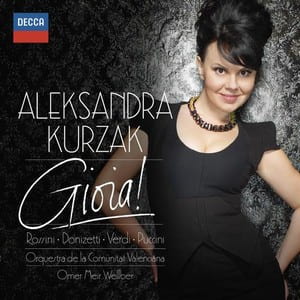 GIOIA!
GIOIA!
Aleksandra Kurzak, soprano; Orchestra de la Comunitat Valenciana – Wellber, cond.
Decca 0289 478 2730 6 (2011)
Aleksandra Kurzak, Polish diva and soprano, on her latest greatest CD Gioia! hits the high notes, singing Rossini, Bellini, Donizetti, Verdi, Pucciini, Mozart, Strauss, and Monuiszko exquisitely, passionately and smoothly. She does so with complete clarity, polish and range. This inspiring CD has reached gold!
The CD features the following repertoire: Una vove poco fa from Rossini’s II barbiere di Siviglia; Giunse alfin il momento…Deh vieni, non tadar from Mozart’s Le nozze di Figaro; Regnava nel silenzio from Donezetti’s Lucia di Lammermoor; Mein Herr Marquis from Strauss’s Die Fledermaus; O mio babbino caro from Puccini’s Gianni Scicchi; E strano…Ah, fors’e lui…Sempre libera from Verdi’s La traviata; Gualtier Malde…Caro nome from Verdi’s Rigoletto; Son vergin vezzosa from Bellini’s I puritani; Una parola, o Adino…Chiedi allaura lusinghiera from Donizetti’s L’elisir d’amore; Quando m’en vo from Puccini’s La Boheme; Do grobu trwac w bezzennym stanie! from Monuiszko’s Straszny dwor.
Kurzak has music flowing through her blood. She is the daughter of a successful soprano Jolanta Zmurko and French horn player Ryszard Kurzak, and was destined to be an opera singer from birth. Her parents had hoped she would become a violinist and also studied piano, but suddenly chose to follow in the footsteps of her mother as a soprano.
She has since appeared in the world’s major operas in major roles and is the recipient of numerous prizes in competitions.
She graduated from the Academy of Music in Wrocław, Department of Vocal Studies (with honors), and the Hochschule für Musik und Theater in Hamburg. She is the winner of the International Stanisław Moniuszko Vocal Competition in 1998, as well as contests in Helsinki, Barcelona and Guangzhou. She made her debut in the Wrocław Opera. In the years 2001-2007, she was a soloist with the Hamburg Staatsoper. Since 2007, she has sung with such theaters as the Metropolitan Opera in New York, ROH Covent Garden in London, the Bayerische Staatsoper in Munich, Vienna Staatoper, the Salzburg Festival, and LA Opera.
What does the future have in store for this rising star? Time will tell, but opera lovers will love to listen to this one now!!!
Gary Fitelberg is a music critic, musicologist and historian specializing in Polish classical music and artists of Młoda Polska.
Obituary
Irving Geller
Irving Geller, Associate Concertmaster and first violinist with the Los Angeles Philharmonic from 1951-1999, passed away peacefully on November 16, surrounded by friends and family. Mr. Geller, born January 10, 1926, is survived by his wife, actress Helen Geller, his children Paul and Valerie, and grandchildren Juliana, Aaron, James and Greyson.
Irving Geller was born in Warsaw, Poland, and began his musical studies at the age of five. He made his solo debut at age ten, playing the Mendelssohn Violin Concerto with the Hull House Symphony Orchestra in Chicago. Performances as a recitalist and orchestra soloist brought the young violinist many awards and critical praise.
While still in his early teens, he and his family moved to Los Angeles, where his music studies continued and he appeared as soloist with various orchestras and on radio.
Geller then became Assistant Concertmaster of the San Antonio Symphony Orchestra; following his three years in Texas he joined the Los Angeles Philharmonic in 1951, becoming one of its youngest members. He has served as Concertmaster of the California Chamber Symphony, the Los Angeles Chamber Society (comprised of Los Angeles Philharmonic members), and other musical organizations in the Los Angeles area.
For nearly 25 years, he was the Philharmonic’s Associate Concertmaster.
Drafted as a machine gunner in the infantry of the U.S. Army, Geller received the Purple Heart after being injured at the “Battle of the Bulge” (1944-45).A memorial service will be held on Sunday, November 20, at Hillside Memorial Park and Mortuary located at 6001 W. Centinela Avenue, Los Angeles, CA 90045 at 3pm. In lieu of flowers, the family requests that donations be made in Irving’s name to the Jewish National Fund, Trees for Israel or the American Cancer Society.
Read more here: losangeles.broadwayworld.com
Anniversaries
Born This Month
- 3 December 1896 – Boleslaw SZABELSKI, composer (d. 1979)
- 5 December 1899 – Boleslaw WOYTOWICZ, composer (d. 1980)
- 6 December 1933 – Henryk Mikolaj GÓRECKI, composer(d. 2010)
- 11 December 1876 – Mieczyslaw KARLOWICZ, composer (d. 1909, under an avalanche in Tatra mountains)
- 14 December 1789 – Maria SZYMANOWSKA, composer, virtuosa pianist (d. 1831, of cholera). Read her biography: PMHS Vol. 9
- 18 December 1907 – Roman PALESTER, composer, broadcaster (d. 1989)
- 23 December 1830 – Adam MINCHEJMER, composer and conductor (d. 1904)
- 24 December 1859 – Roman STATKOWSKI, composer, teacher (d. 1925)
- 29 December 1902 – Henryk VARS , film and popular music composer (d. 1978)
Died This Month
-
3 December 2004 – Marek STACHOWSKI, professor, composer, and administrator at the Music Academy in Kraków (b. 1936)
-
11 December 1945 – Seweryn EISENBERGER, pianist (b. 1899)
-
20 December 1834 – Maurycy MOCHNACKI, music critic, writer, pianist (b. 1804)
-
21 December 1938 – Arnold LUDWIK, violin maker (b. 1873)
-
21 December 2005 – Ryszard SIELICKI, pianist and composer (b. 1916)
-
23 December 1885 – Artur BARTELS, pop singer (b. 1818)
-
23 December 1869 – Julian FONTANA, close friend and musical associate of Chopin (b. July 1810)
-
24 December 1898 – Eugeniusz PANKIEWICZ, pianist and composer (b. 1857)
-
26 December 1945 – Stefan STOINSKI, music ethnographer, writer, conductor (b. 1891)
-
29 December 1913 – Jadwiga SARNECKA, pianist, composer, poet (b. 1877)
-
31 December 1944 – Marian Teofil RUDNICKI, conductor, composer (b. 1888)



